#literally so many of my characters hold so much meaning because i started out thematic exploration with her first
Text
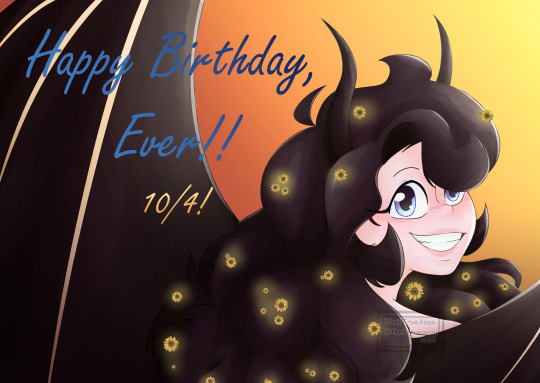
HAPPY BIRTHDAY TO MY BABY DRAGON GIRLLLL AUGHHHH I LOVE HER SO MUCHHHHHHHH 💖💖💖💖💖💖💖
augh she means so much to me she's literally the transition point for pretty much all my OCs after like, 2019/2020. literally this woman right here, this force of nature, helped teach me so much more about character design and story and characterization than pretty much any other character ive ever made since i started making them as a kid. the only oc with that much of a role in my creative life would be Trinity, my very first ever OC who i started out with when i was like, 8
seriously, Ever is the girl and i love her so much. heres to 4 years of Ever!! 🥳🥳🥳
#also#happy cinnamon roll day :3#EEEEE AUGH I MISS MY BABY GIRL#4 YEARS WITH MY GIRL#aaa its been a trip -w-#literally so many of my characters hold so much meaning because i started out thematic exploration with her first#im so glad i did so much of my character design and writing has gotten so much better because of her#much love to my girl -w-#anon speaks#anon's art#anon's ocs#undertale#undertale multiverse#utmv#undertale oc#undertale multiverse oc#utmv oc#ever#evermore!catherine#utmv ever#anon rambles in the tags
7 notes
·
View notes
Note
starting STRONG with chisme: 😅 What's a story or scene you've created that you're a smidge embarrassed exists?
😈 Has there been a point in a story where you did something just to be playfully mean to your readers?
🛒 What are some common things you incorporate in your fics? Themes, feels, scenes, imagery, etc.
❌ What's a trope you will never write? (note: don't say teacher/student because that one I already know and I am legit curious if there are any OTHER tropes that are never nevers for ya!)
🎉 What leads you to consider a fic a success?
😅 You KNOW I love chisme, so let's see.... a lot of my more embarrassing things never make it to Ao3. I also am just hard to embarrass. Like, I wrote my very first fic when I was pretty young and now I think it's cheesy, but also it has a lot of things that I still do (I remain a slut for tenderness and second chances and miscommunication and imperfect people making it work) and I feel such affection for baby me who wrote it. So going to something that's embarrassing enough that I never (and will never) published it, I have a high school AU of the TV show Kings that involved the characters putting on the musical Rent. Which is just such a sentence, but it was fun to write at the time. I know it was a different ask, but I would also pay a LOT of money for nobody IRL to ever read my Old Guard fic "she tied you to the kitchen chair" but that's because I don't want my students or coworkers or parents to get any ideas about my relationship to knifeplay (which I don't have! It's characters only! But I still don't want to have that conversation!)
😈 playfully mean... does stopping stories before they get to sex scenes count? Because I spend the entirety of the Billy Elliot fic "Take Me Up and Hold Me Gently" building up to a sex scene that I did not write. In a similar sort of tease without followthrough, I hint at Eliot as a Dwarf in my Leverage-Lord of the Rings crossover and then end the story before you actually get to spend any time with him. Though I'm not ruling out a "Let's Go Rob Smaug" sequel that gives him more screentime. The only other thing that's coming to mind is my unpublished WIP Old Guard Joe/Nicky enemies to lovers royalty AU where I keep letting them ALMOST communicate what they need to and then having something drive them apart again. Oh, and in the later fics of my Jane Austen/Temeraire crossover that I just started posting this week Elizabeth Bennet is literally never going to meet Mr. Darcy. Sorry!
🛒 (Mis)communication. Every damn time. So much of real life is about making connections with other people but it is so hard and so vulnerable to actually do that work and we all carry around so many assumptions and secrets I just... it's always relevant. I especially like thinking about communication between people who have very different life experiences, whether because of trauma or geography or queer identity or centuries of immortality. I also love building a story around a Secret that is central to the character and then dealing with how keeping or revealing that secret changes their relationships. Another sort of big thematic one is choosing relationships, both in a chosen family sense and a romance sense. I really think about relationships as an active and ongoing commitment, so my characters also spend a lot of time thinking about what those commitments are and what responsibilities they have to the people in their life. And then my characters (when appropriate) all have crushes on David Bowie, go to midnight showings of The Rocky Horror Picture Show, and hate Ronald Reagan.
❌ You are 100% correct that teacher/student is a hard no for me. In the same vein, I'm pretty unlikely to write anything that could be meaningfully tagged as "Age Difference." Like, I will write canon Andy or Quynh or Booker with a mortal person in their 30s+, but that's not really what that tag is for. I don't write explicit fic, so anything that is 100% a sex trope is probably not going to come up. Also, A/B/O or dom/sub AUs (like where the whole world is divided into doms/subs, not just an individual character dynamic). Otherwise, I can at least think of a scenario where I might write a trope, even if it's pretty unlikely. I've definitely written things with tropes that I would never read if someone else did it.
🎉 I do a lot of (a very different kind of) writing in my professional life, so I really firmly believe that if I'm writing for fun it should BE FUN. So for me, a fic is really successful if I enjoyed writing it. I also am always really proud when I re-read a fic and I feel the same emotions I felt while writing it. Like, if nothing else, my writing is making me feel things! I try not to focus on the external metrics of success, but the one that really does get me is literally any comment that suggests that somebody else cared about this story. That can be a "reread kudos" because it means that somebody spent part of their life reading my story and then for some reason came back and did it again!!! Or, it can be somebody who found that the story resonated with them, like some of the comments on my Leverage series make me super emotional because people are talking about their own experiences of being queer in a conservative area or coming out later in life or parenting. And I don't have personal experience with all of those things, so the fact that my story resonated with people who do have those experiences makes me feel like I was successful (and compassionate and putting good out into the world!) in writing them.
2 notes
·
View notes
Note
Heyyy bestie guess who...
I think your point about love interests is so right, there's less of a focus on how they interact because they're just friends in the later seasons, theres no winning over a nurse moment because they don't need to be won. Also I miss ginger :(
I like your idea about the names and faces mixing too, it plays into the idea of time blurring so three years plays out over 11 seasons.
His fear(?) that he's seen and done too much over his time there is also so interesting, he doesn't feel like he deserves love or affection almost. I mean this in an aro or non aro way too, im even thinking that it would be really interesting if Hawkeye realised his views and feelings about romance and romantic love while in Korea and it took a long time for him to realise that it wasnt something that the war did to him, that it was just a natural part of who he always was.
Also heres where i admit that I stopped watching around season 8 i think(?) because, as you said, of the way the show seemed to constantly punish Hawkeye and how the support he'd had from the beginning has been draining away. (with the exception of Margaret, but one person can't hold him together when he's trying to hold everyone else) I do plan on finishing but i just got away from a similar problem and I don't want to watch it happen when I haven't talked it out properly first lol.
Also all of his lighter moments in the later seasons, especially the ones you mentioned, lack the sort of catharsis he really needs. They're all still about what he does for others, i cant speak on it until i watch them of course bit there seems to be much less gestures and acts of kindness for him.
Okay last points! I really feel like its too late to start censoring fuck my dude, that ship has sailed. I plan on saying more about your last response but its such a beast that im leaving it for my train ride tomorrow where I'll hopefully be able to put it together<3
-majoranon
I hope your train ride is good!
I am personally a glutton for pain (yes I'll leave that phrasing as it is), so I don't mind seeing him upset and worn down 😈
but I definitely feel like he's not given so much softness -- and the turning point was around season 8 I think, because I literally documented Moments between him and BJ and Margaret in s7 (+ season 8 was when Radar left and Period of Adjustment happened and Preventative Medicine was near the end of s7....), and I guess it's because he's increasingly Keeper Of Narrative Themes (vs other characters who carry mainly themes related to themselves and their personal journeys), which puts him in a slightly disconnected space -- the Narrator, Mad Max, Puck, (my flatmate was like "Horatio is also depressed and gay and tells the narrative" and they're not wrong) etc.... so even when he's having fun with the others, or having a moment where he's been relinquished for a second from Narrative Themes to be in the ensemble it feels to me watching like he's on a leash (no I won't change that phrasing either) -- he's still in the prison of the story, it's just giving him a bit of enrichment here and there, but less and less as we careen towards The End
also about aromanticism (forgive me if you already know + you know... things Many Queer People Feel For Similar Reasons) is that it's framed as brokenness by wider society. Romantic Love is the highest form of connection between people and so not being drawn towards this idea is an indication of something being wrong with you and a lot of aro people internalise that
and so the idea that Hawkeye can't disconnect his "incorrect feelings" from war trauma + his thematic role in the Story in which he's being increasingly separated narratively from the others... *charlie day meme*
all of this to say, yeah yeah "communal sub sounds sexual and also that," but mainly I think if someone cradled the back of his head while they gave him a really big hug (kinda like in s7 "Ain't Love Grand"), it might break me (and also him) and that I will on my rewatch document when we've had a moment like in "Peace On Us" where for a second Hawkeye is protected from the violence of the role he plays by the whole camp throwing him a party
(also that Stars and Stripes + Bottle Fatigue + Heal Thyself + Dreams were s8 and I don't know what I'm trying to say there but it certainly makes me stare at a wall)
(also this isn't to say that other characters aren't also occasionally doing their turn as Keepers of Themes or even that Hawkeye-centric episodes tend to be that, so much as when there's ensemble work happening he's increasingly given the War Is Hell perspective)
#MASH#hawkeye pierce#im watching MASH#the landscape of the narrative is going open its gaping maw and swallow him whole#(look i know this won't happen but also my brain is like *what if he just literally got eaten by korea as a Place*)#(it's not a horror story but it IS a horror story)#majoranon
5 notes
·
View notes
Text
3x03 :: ghosts and reality
So I was thinking about 3x03 “Ghost,” an episode that both subverted my expectations and fulfilled them. Back when the the episode titles for Book Three were released before the season came out, I predicted that “Ghost” would have Soren and Claudia confronting their father in prison. I ended up being right with that prediction, and was also unsurprised when Claudia and Soren’s confrontation with their father figure was included the episode.
The way Rayla parallels Soren and Claudia has often reminded me of the way that Katara parallels both Zuko and Azula, and the each character’s relationship with their father is paralleled by one another’s. Which is to say that the confrontations with Viren and Ethari in 3x03 are directly, and poignantly paralleled, and here’s why.
Moonshadow elves are the ones most closely aligned with TDP’s interrogations of truth, illusions, and lies that exists for many of the main characters, particularly for Rayla and Soren, Claudia, and Viren. The three children have returned to their respective homes, finding nothing the way they expected. Rather than having to worry about disappointing their father the way they did in s2, Claudia and Soren find their father in prison, and Rayla finds Ethari imprisoned in his own grief.
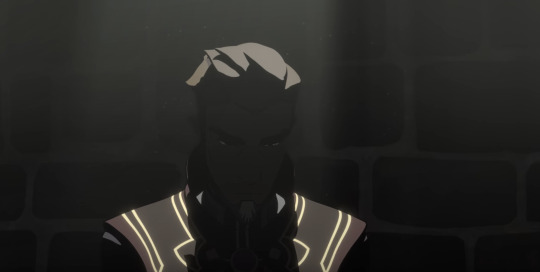
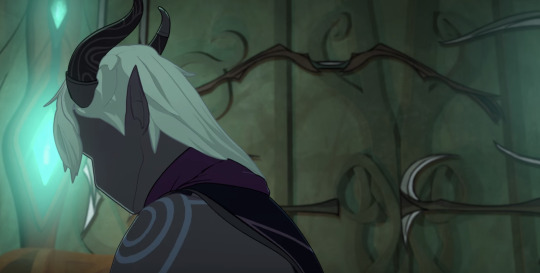
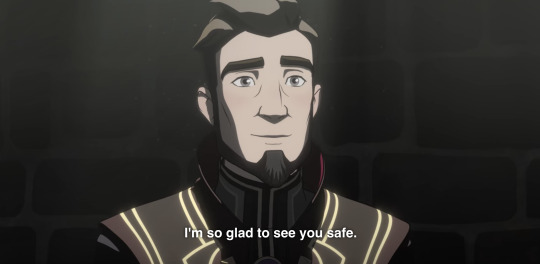
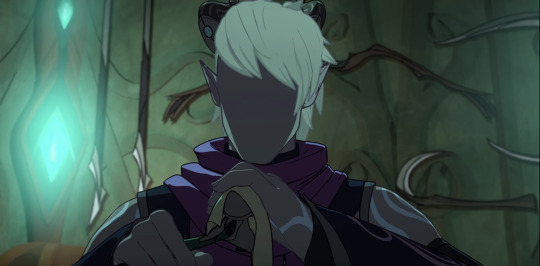
And both fathers are concerned and connected, thematically, most strongly with the idea of Reality.
But this is also where they diverge the most strongly.
Both Ethari and Viren erase their children’s reality. Rayla is turned into a Ghost, as Ethari erases Rayla from his reality, even if he can’t quite erase him from hers. Viren, meanwhile, erases Soren’s memory of events by gaslighting him. The differences start even here, however, as Ethari is never able to hide from what he’s done — not with his daughter right there, holding him accountable — whereas Viren sweeps his own actions under the rug.
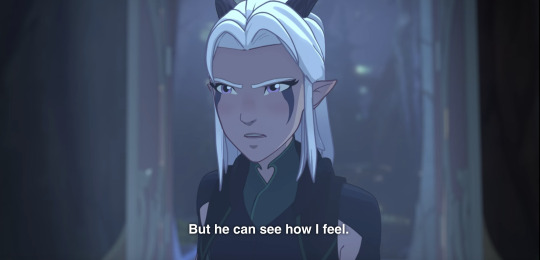
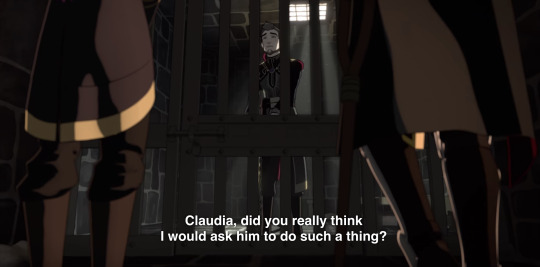
Ethari and Rayla, for all of their flaws, are emotionally open and honest throughout their initial, half one sided, conversation. Ethari’s main problem is arguably that he is too honest, too consumed by his grief. Viren slips similarly before covering it up again, motivated by his selfish mission rather than by love, however misguided Ethari’s attempts at navigating his feelings are.
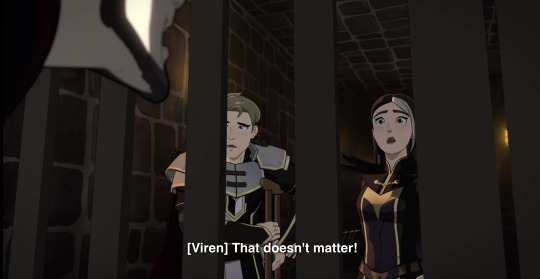
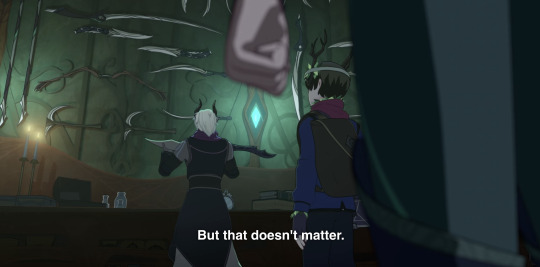
Even in the throes of his grief, Ethari acknowledges his and Runaan’s own wrongdoing, while Viren just doubles down on weaponizing Claudia and Soren’s state against his son.
E: Before you left, I told Runaan you were too goodhearted for the work of an assassin, so I know you did not betray them out of malice. But that doesn’t matter. They’re gone. He’s gone. Because you abandoned them.
V: This is disappointing son, even for you.
Don’t get me wrong, what Ethari says is still terribly damaging and shitty, but he’s still operating under an assumption that literally everyone else around him believes, nor is it one he’s constructed. Viren, meanwhile, purposefully crafts himself a way out, even if it means throwing Soren completely under the bus, insulting his son’s intelligence, and sowing seeds of doubt in his reality.
Thus, while Rayla herself is the ghost, Soren’s memory becomes his: a reality that only he can remember and believe in. Something only he can see clearly for what it is as even his sister looks away from him. And by the end of the episode — or even the entire season — that remains true.
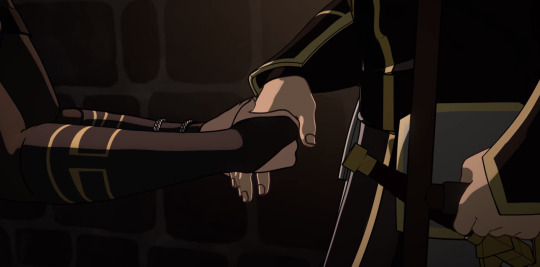
But it changes for Rayla, because Ethari comes back around.
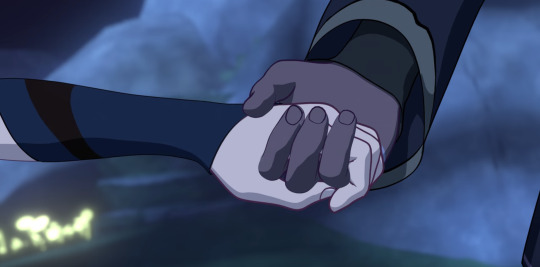
Ethari is still operating the same assumption as before when he joins Rayla by the fountain. Nothing about his actual perspective has changed — he is still mourning his husband (and daughter), he still believes that Rayla has abandoned/betrayed them — but he loves her anyway, and shows it by breaking what appears to be the number one rule of the ghosting, and undoes the spell as much as he can on his own.
Ethari refuses to deny Rayla’s reality and does give her a chance to explain herself, and then aids her in her mission, because he trusts that she’s doing the Right Thing even if it still led to dire consequences for their family.
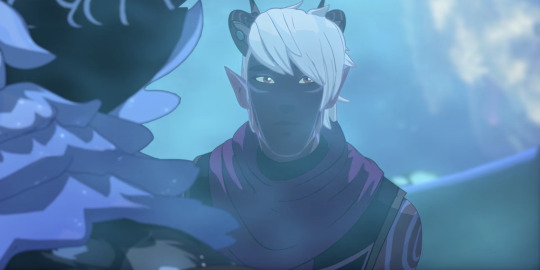
But Viren (and Claudia) only continue to mess when Soren’s understanding of reality as the season wears on, until they all deal the final blow in 3x09 — literally.
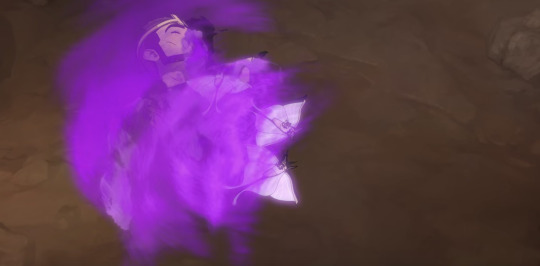
Ethari’s illusion was that he didn’t love her still, and in some ways, Viren’s illusion was that he ever loved his son at all.
Other Misc. Notes:
Another interesting thing about this episode is the contrast between Callum and Claudia. Both witness someone they love being terribly mistreated, and while Claudia is initially indignant on her brother’s behalf, she quickly succumbs to her desire to keep both her brother and father in her life, rather than having to choose between them. The way the bars divide her and Soren from each other in various shots is a great reflection of this. Callum, meanwhile, stays indignant and angry on Rayla’s behalf, demanding change, supporting and trying to get through to her.
Where Soren is begging Claudia to believe him, Callum is arguing that Rayla should, and their families respectively follow suit: Claudia sides with Viren, who gets away with his deception, and Ethari sides with Callum and Rayla, encouraging Rayla on her new mission.
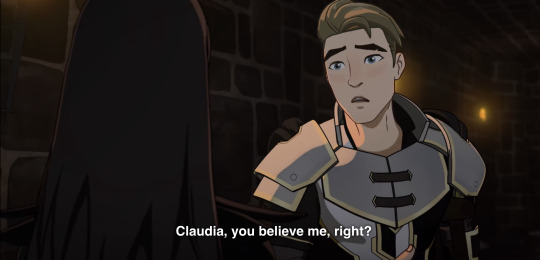
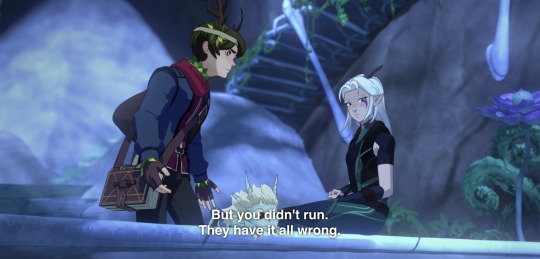
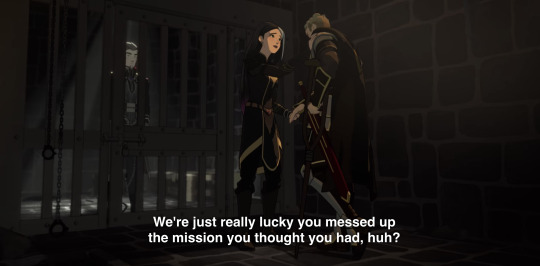
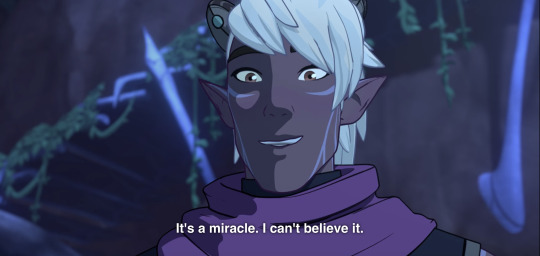
There are also arguable parallels to be had, with Rayla, Viren, and Ethari all occupying the position of Explainer, or even defending themselves and their actions. The fact that Rayla and Ethari have to do this for each other shows the closeness they share and a willingness to at least communicate, whereas Viren’s is self contained and wholly in pursuit of convincing his children of what he needs them to do. Other parallels as follows is Viren’s “I’m so glad to see you safe,” Rayla’s “I’m so glad you’re here,” to Ethari, and Ethari’s “I couldn’t bear to let you leave without seeing you one last time.”
To love someone is to bear witness to them, to See them for who they truly are and to love them anyway. To engage in, not erase, their reality. One father learns this and stands by it, as much as he possibly can. The other does not.
#tdp meta#tdp#tdp rayla#the dragon prince#ethari#viren#tdp soren#analysis series#knight sibs#morally ambiguous fam#moon fam#s3#3x03#different than my usual meta faire but very fun#analysis#parallels#on the shorter side too which is honestly kind of nice
182 notes
·
View notes
Text
Penny and Winter as Symbolic Human Machines
So honestly, I’m really impressed by how well done the ending of RWBY Volume 8 was with regard to character arcs being fulfilled, especially for Penny and Winter. I’ve seen a lot of takes, some that I somewhat agree with, and some that I just don’t, that Penny’s death was “bad writing,” and I think that, subjectivity of what constitutes bad writing aside, this is ignoring a lot of aspects of V7/V8 that made for a very compelling narrative, and feels heavily based in just people wanting Penny to not have died.
And I get this! Penny is one of my favorite characters and I’m very sad that she died; however, I really actually loved how fitting her death was for her story and the broader story of RWBY as a whole, so I wanted to do a write-up of my whole rant on this so that people could read it and see my thought process for why this only made me love Penny’s writing more. I’m not necessarily going to ascribe value to the writing itself in this analysis, as that is highly subjective, but I am biased so that’ll shine through some.
V7 through V8 had a lot of moments that frankly I hadn’t picked up on right up until the end that worked to build a dynamic interplay between Penny and Winter’s characters. Specifically, Penny's role is of a literal robot becoming less of a machine in the thematic sense and more of a person throughout, contrasting with Winter, who, while she is helping Penny realize herself as more of a person and less of a tool, is going through the opposite experience herself.
This is essentially textual - it’s explicitly said by Winter herself in less words during the Maiden power transfer scene in V8E14.
When we as the audience reconnect with Winter at the start of V7, she is firmly entrenched as Ironwood’s confidante and second-in-command, serving as a face of the Atlas military as it squeezes Mantle. It’s safe to say that not many Mantle citizens like her very much, but she is insulated from this and continues to follow orders without regard for the welfare of the people. Ironwood at this point is already extremely authoritarian, even though he hasn’t graduated to full on dictatorship and declared martial law yet, and his will is also imposed on her through bringing her into the fold with the chief purpose of grooming (god this word feels grossly fitting given their dynamic) her to become the next Winter Maiden.
Winter, despite holding a a significant level of power and authority due to her military rank, has very little agency in this decision. She insists that her choice to take up the duty as Ironwood ordered is something she’s grown into and chosen, but it’s alarmingly clear that this is not the case; nearly every action she takes in V7 is still fully in the purview of Atlas (read: Ironwood)’s goals. I would go so far as to suggest that Ironwood giving her this position within the military after she escapes her father’s influence is intentionally conditioning her to view him as the sole way out of an abusive situation, and to disguise the fact that this new situation is just as abusive as the first below the surface.
Penny’s role in V7 is completely in opposition to this; while she is still theoretically under the control of the Atlas military, she is presented as the Protector of Mantle and seems to be beloved by the people. Our immediate image of her in Atlas is one of emotion and caring; she is overjoyed to see her friends from Beacon again, and this continues throughout the volume as she talks about what it means to be a person with them, Ruby and Winter especially. When things start going wrong and she is accused of killing people through the doctored footage from the rally, she is horrified at the prospect of being seen as a monster and continues to make every decision with the aim of protecting everyone around her, even at the expense of what her “duty” to Atlas might be. It’s clear that she is growing into her own agency, rather than being beholden to what Ironwood wants for her, and this helps prove to herself that she is her own person, not simply a tool of the military, not a machine.
The climactic scene of V7 takes these two character arcs running in strained parallel and drives a wedge between them, even as they battle a common enemy side by side. Winter’s devotion to Atlas (read: Ironwood) results in self-destructive tendencies, uncaring for her personal survival if it would further a goal that she ultimately and ironically does not truly believe in. Penny, however, begins to entirely shake this duty, risking even the Maiden power going to Cinder if it means saving Winter from dying. To her, personal feelings (ding ding ding!) and personal friendships mean more than duty to a state, or even (as we see later) her own well-being. Self destructive tendencies aside, this loyalty to people she earnestly cares about, who earnestly care about her, is loaded with symbolism that separates her from the metaphor of machine.
The result of the V7 finale reinforces the track the two of them are on; Winter, having been molded into a machine of the military, fails in her duty, while Penny, who has begun to recognize herself more and more as a person, succeeds at keeping the power from Cinder. She still has a massive amount of self-doubt and deep-seated fear that she doesn’t count as a person, but the Maiden power, being the perfect thematic symbol of “maidenhood”, goes to her, proving her to be a “real girl” and reinforcing the ongoing narrative. Winter, battling her own mixed feelings over being chosen for the power, never questions this; it’s clear that she, too, recognizes that Penny “was always the real Maiden, while [she] was the machine.” This also reinforces Penny’s narrative being heavily trans-coded, but I think that’s pretty obvious and doesn’t need to be reiterated. The two of them part sides here, one remaining with the Atlas military and one actively rebelling against it.
As Ironwood starts going off the deep end at the end of V7 and throughout V8 and starts sacrificing everyone around him to fuel his own narrow and tyrannical view of how to save Atlas, Winter simply...falls in line. She is continually forced to follow harsher and harsher orders, and any choices she makes as part of that, with only two exceptions, still are entirely in service to Ironwood. She has become, in essence, a machine locked into a set path, a path she, conflicted as she may be, follows all the way up to a choice she cannot abide - mass murder. Even orders that would result in her sister’s closest friends’ deaths she follows unquestioningly - it’s unclear whether she would have actually gone through with it, since the option is taken off the table by forces outside her control, but she certainly says as much in her conversation with Marrow. Only the prospect of annihilating the entire city of Mantle finally snaps her off the track Ironwood has set her on, making her recognize that all of this has never been for Atlas at all, but for Ironwood’s own ego. Fittingly, finally seeing Ironwood as her enemy and not a savior, she is tasked with taking him down herself.
Contrasting this, Penny’s role in V8 is entirely one of rebellion. The entire volume is her building her agency more and more, making decisions based on what she thinks is right and what she values. She rarely listens to any one person telling her what to do; even her father, who she loves dearly, isn’t able to make her do something when her sense of justice is on the line. Ironwood no longer has his hold on her for the most part; any attempt at manipulating her into doing something against her own morals is met with defiance, supported by her friends’ love for her. She has to be outright hacked to be forced into doing his bidding, and she fights this all the way down, her own inherent personhood pushing back against this attempt to dehumanize her. In this sense, even her becoming organic symbolizes this; she and the people she cares about defy this dehumanization of her, finding a way to free her from the last remaining vestiges of Atlesian influence and further reclaiming her own agency.
And what does she do with that agency when she is faced with oblivion? She simultaneously affirms it by making her final choice in a desperate situation, defying Cinder’s attempt to rip her power away, and also gifts it in the form of the Maiden power to the woman who she is watching attempting to also shake the shackles of Atlas, symbolically showing Winter her own inherent humanity. This decision, though dire, is in recognition of what is most important to her: her friends. Even believing half of them are dead, she gives up her life to ensure the rest survive. In the final moment she has with Winter, she reassures her that she won’t be really gone: the memory of her choice and who she is as a person will live on through Winter’s continued choices, through her agency.
In the end, neither of them were machines; just two hurt people fighting back against a brutal world that sought to strip their agency away. The tragedy in this conclusion, that that brutal world took one of their lives away, is fought just as defiantly. Penny knows that gifting the power in her soul to Winter means that her death won’t be meaningless, that her agency will last beyond her mortality and might result in the world finally being freed from the threat of destruction. It’s because of hope, not despair, that she makes her final choice.
#rwby spoilers#rwby8 spoilers#my writing#CRITICAL ANALYSIS TIME#i've been meaning to write up my rant on this for months#rwby#winter schnee#penny polendina
140 notes
·
View notes
Text
okay. thoughts on the grad finale
gonna slap it under a readmore bc i’m Sure i’m gonna ramble.
uh spoiler warning for the finale of taz graduation, as well as spoilers for the season in general.
also, these are my own thoughts of how the season went, what the themes were, etc! if you don’t agree with me, that’s fine! but i don’t wanna have a convo w you in the replies about it i’ll be honest. if you want to share your opinion so badly, make your own post, alright? that good? we cool?
aight. so. finale thoughts.
to make it short: i think the finale was a satisfying end of a very good arc.
to expand upon that, let me share what i think the themes of graduation were and why the finale satisfies those themes.
i made a post about this a while back (here it is if you want) but my honest belief was that the theme of graduation was self-reliance: the concept that you don’t allow yourself to be governed by forces that go against your own beliefs. this concept was coined by essayist ralph waldo emerson to talk about how the american people shouldn’t allow the government to create laws that go against the will of the people. now, understandably, this feels very anti-capitalist which is what i think a lot of fans believed was reflected through the season.
but, in reality, self-reliance has more to do with being active in your government and making sure you’re being represented the way you want to be by your representatives. that’s sort of the vibe emerson was going for in his essay, and i think. in a sense? that translates to graduation. but i took self-reliance in the more metaphorical about breaking away from those things that are controlling you. which, in graduation, was A Lot Of Things.
the way i saw it, there were two major groups that inflicted order upon the world and the thundermen--conveniently separated as order and chaos (not the deities though, just the concepts).
the order half of control existed mostly through the school and the HOG. the HOG created the economic reliance on the heroes and villains system, which removed all literal meaning from those terms and turned them into bureaucratic titles. society existed under these very strict checks and balances; heroes and villains supplied money to the kingdom in terms of entertainment, which then boosted that kingdom’s creditability and allowed them to contribute more to nua’s economy, which then led heroes and villains to have a higher demand, thus perpetuating the cycle. it’s important to note that this term does not represent the sort of morality we expect for heroes and villains--hell, even the term “evil” turned into an arbitrary term used to show those heroes and villains who failed the system. this is the more prominent representation of control that the thundermen break away from in achieving their own self-reliance. they don’t see the value in a system that holds no real moral code (fitzroy Especially, but i’ll get into that in a bit), and can’t help the public when there’s actually a serious situation. as we saw with althea in the beginning, the HOG had no way to help the thundermen when they were dealing with the whole Demon Prince situation (as he had already placed some of his own people in there, proving these kind of systems are easily corruptible). so this wasn’t a system meant to Actually create heroes and villains--it was just a way of boosting the economy.
the chaos half of control existed primarily through grey and Chaos. grey represented how chaos could be controlled, through various means. he planted that tree for the centaurs to fight over because he knew it would constantly create conflict, which he enjoyed. he kept the school under a watchful eye to prevent anyone from stepping out of line with his grand ideas, and used several manipulation tactics to try and get his way (most notably, his own admittance of grooming fitzroy into joining his side, which didn’t work). grey was the perfect example of how chaos does not automatically mean a lack of control. he was very controlling in how he did things because he had an endgoal: find hieronymous and have a war. but he didn’t even realize he was contributing to a greater idea, that being Chaos’s insistence on causing general disarray. as we realize now, Chaos’s plan was both for them and Order, but i’m leaving Order out for a second because they only really rear their head in towards the end. for the most part, audiences were led to assume that Chaos was the Big Bad(TM); they were the one pulling the strings, allowing things to happen to cause general chaos and disarray. them supplying random mortals with their endless power was a way to plant chaos into the world of nua; but it was a chaos they controlled. fitzroy resisting them was not simply a refusal to bend to Chaos, but it was resisting the control put on him through his magic.
these systems were constricting the thundermen on both sides. when they thought they’d find help in one side, they were disappointed to find that there was nothing anyone could do. the only people who could fix their problems were...them. so they forged a new path, set new ideas, and became self-reliant. that’s what i think is the most important aspect of graduation; not the anti-capitalist implications of turning over the economic and political systems in place, but the idea that if nothing that is supposed to help you is actually helping that you can just...do your own thing!
and i think that’s what the finale really shows, at the end of the day. that these forms of control were not doing anything helpful, and were in fact ruining the fabric of space-time! that’s where i think Order comes in because Order is really...the ultimate culmination of control. they are aware that Everything being done will benefit their cause. the HOG? well, they make sure everybody’s so incompetent that they can do their work. grey? well, he’ll contribute to the plan without even realizing it. they even manipulated Chaos and enacted their own form of control over Chaos to make sure that they had no reason to believe that this plan couldn’t go wrong. but Order knew. Order always knew there was a chance for error, and that chance was very great. but they didn’t care! so long as they had control of things, they could try a hundred times to get it right. they had no care for mortals, unlike Chaos.
the thundermen showing Chaos the truth is the final jenga piece that collapses this tower of control. which is why the finale is so great.
travis does a phenomenal job of incorporating chaos (general chaos) into the battle mechanics. it may be stupid and slightly arbitrary, but having them change forms randomly and having to adapt to those new circumstances really does exemplify the season!!! the thundermen were constantly forced into new situations (being sidekicks/henches, fitzroy becoming a villain, being let in on the heiro dog situation, the unbroken chain trial, joining forces w grey, etc.), and in all of them they simply found a way to adapt and keep working their way. which made the finale generally interesting and also thematically interesting!
i think my favorite part of the entire fight scene is right at the end, when argo chucks the shark’s tooth necklace at Order. and time stops. and they’re given a choice.
the fact that they leave it to a coin toss?? oh my god...how fucking FITTING!! like, that’s disorderly. that’s going your own way. it’s new, it’s terrifying, it has DIRE UNKNOWNS ON EITHER SIDE, but it’s what they do! and...it ends up working out! i think it would’ve worked out either way, but the fact that they left it up to chance really shows how they aren’t allowing anything to control their actions.
AND THEN WE GET TO THE EPILOGUE. MY GOD I LOVE THE EPILOGUE I’M GONNA GO OFF SO MUCH.
first off, i loved hearing how Nua adapts to losing this very significant form of government/economic contributor and turns to more people-based work. citizens uniting together, fixing things, making amends, THAT’S SELF-RELIANCE BABEY!!! THAT’S THE WHOLE EMERSON SHIT! HAVING A SYSTEM OF GOVERNMENT THAT ACTUALLY HAS THE INTERESTS OF THE PEOPLE AT LARGE!!! YEAHHHHHHHHH THAT’S THE WHOLE SELF-RELIANCE THING!
now, i’ll break it down by characters:
fitzroy
GOD. LOVE IT. FIRST OFF, absolutely ADORED how his character arc involved him stripping himself of these self-assigned titles because he actually has an identity that is all his own and he doesn’t NEED arbitrary titles to prove his worth because HE HAS IT IN HIMSELF. not to self-plug or anything, but that’s ssoss!fitzroy’s WHOLE SHIT. I’VE ALREADY BEEN ON THIS TRAIN, BITCH, AND TO KNOW I GOT IT SO RIGHT...GOD. FEELS GOOD.
but also, i just really enjoy how his ending went in general. the fact that he doesn’t really know what he wants to do, so he just...does stuff he likes to do? that’s so good! because, if you remember, fitzroy had a Very set schedule of life events when the campaign started. he was going to get his wiggenstaffs degree, go back knight school, get his knight school degree, and then go to goodcastle. but all of that was based on a very limited understanding of himself.
fitzroy’s character arc has primarily focused finding himself, specifically in terms of identity. for someone who was bullied for his past, the present formation of himself was Extremely important to fitzroy. he thought that shutting out his past and taking on this grandiose title of knighthood would make him something more than himself. he would no longer be fitzroy; the poor, country kid trying to make it in a big world. he’d be Sir Fitzroy Maplecourt; respected, honored, revered, with a title to prove it.
he explains to fauxronymous (pre-reveal grey) that the reason he wanted to be a knight was because he wanted to assist in doing good. morally good. fitzroy has Always had a very clear sense of his morality; this comes through when he refuses Chaos on the basis of many people having to die if he agreed. but being a knight also had the added of bonus of a very respectable title that no one would want to look beyond, which fitzroy felt he needed because...i don’t think he Saw anything beyond that. in himself. he wasn’t himself for a very long time, and i don’t know if he ever thought he would be again. he’d wear this new identity, start a new life, and be happier....he hoped.
then, things changed! and he started to realize that arbitrary titles don’t do shit because plenty of people with Big Important Titles ended up being Awful People! so he started to value himself For Himself; his wit, his humor, his strength, his magical prowess. and, i think, he started to wonder what knighthood was Really about. was it about upholding a moral good? or was it just another bureaucracy filled with people who won’t do shit when things get bad.
i think this is why him becoming a lawyer is fitting. especially because of the reasoning he gives sylvia nite. now for A LOT OF PEOPLE, i’m sure they hear lawyer and assume some corporate hotshot who doesn’t give a shit about people. but fitzroy is Not applying to be a corporate laywer. he SPECIFICALLY telsl sylvia that he wants to help people who cannot help themselves, and he wants to do good in that way. THAT kind of lawyer is more of the pro-bono, district lawyer. the ones that don’t make crazy amounts of cash, but help those who cannot afford lawyers and represent them when the government is fucking them over. those lawyers don’t rely on title, they rely on principle.
that’s the perfect representation of fitzroy’s growth. holding his identity within himself, while still trying to do good by those who need it.
firbolg (aka gary)
i think the firbolg’s ending is so unique but so...right for him. his character arc has really been focused around finding his family. he had one, in the beginning, in his clan. but that didn’t end up, y’know...working out that much. so he had to go out into the world alone--something that firbolg’s are rarely--and try and navigate these foreign spaces all by himself.
we see very early on how he latches onto the idea of groups. he likes being considered a part of the thundermen; he very much hoists himself upon the CFO title and wears it proudly. i think, where fitzroy needed to find identity within himself, the firbolg needed to find it within other people. which is completely okay! he’s still an individual, but you can tell he finds comfort in numbers because that’s what he is used to.
him going back to his clan was, i believe, his finally severance with his identity as “firbolg”. he would never be welcomed back to his clan, and one of the few people in his life who supported him was now dead. but his father was proud of him; his father was happy he seemed to find his own clan, even if it wasn’t with other firbolgs. from that moment on, i think the firbolg begins to try finding himself within the thundermen. within his friends.
so his epilogue is neat! it definitely captures the loneliness he feels on his own, and how he feels lost with himself without others. i think it might seem silly to some that he would become a gary, but i think it’s fitting. the garys were always present in his time at school, and they were always helpful. they didn’t mind how long it took him to talk because the gary’s are stone gargoyles--what the fuck do they care about time? it was a group that the firbolg saw as familiar to him--always willing to help, slow, stony, and attuned to a larger group.
and i think the way gary takes this idea of unity and family and puts it into financial assistance just...it just ties everything together! we saw how attached he got to the concept of finances, thanks to his very confusing accounting class. so he had all of this new knowledge--this knowledge that represented a separation from firbolgs--and this new clan. and he used it to help other clans and families!! i think the fact that the Garys financial advice works specifically with groups is what makes this so fitting. because gary wants families to feel stable within themselves; he understands how finances can create struggle and divides, and he wants to provide relief.
giving financial advice to communities so they rely on themselves and not the government (aka inviting them to be controlled once more) is a VERY self-reliant concept. not that i think gary’s goal is to have no social networks to exist, but he wants to give communities the ability to rely on one another and foster that feeling of togetherness. so groups aren’t fighting over things, but are trusting and loving and relying.
just like gary’s always wanted. and just like what he has with the thundermen.
argo
argo’s ending is probably the funniest, but also the sweetest. i think that argo’s character arc revolved around finding his place. we see how argo’s early personality and motivations revolved around his past. he very much had a revenge story since the start; he wanted to enact revenge on the commodore for murdering his mother, no matter what it took. which made him very limited!! in terms of the self. he saw himself less for what he was now, and what he was then. and what he couldn’t do then.
we see how much he finds comfort in being a part of the thundermen, but also how he feels...out of place. i think this is because a part of him is still attached to his past and doesn’t think he can do anything beyond his set plan. the unbroken chain certainly contributes to this, by not only separating him from the trio but also reinforcing his connection to his past through his mother’s involvement in the unbroken chain.
the commodore also being a part of the unbroken chain is, i think, what causes the shift from past to present within argo. his life’s goal is standing right in front of him--attached to the group his mother once was a part of--with his friends at his side. letting the thundermen in on his history is the start of bridging these two halves of argo. and the fact that the thundermen are so willing to helps makes argo feel more a part of the team and more a part of this reality.
when he kills the commodore, it isn’t intense. it isn’t overly dramatic (minus the fight prior, which was BADASS), it isn’t crazily staged. it is argo, staring down the commodore who lies prone on the ground.
he kills himself unceremoniously and completes his life-long mission.
what becomes of him in the epilogue is the culimination of both past and present. he takes what he knows and loves (the sea, the mariah, sailing) and blends it with what he’s come to love now (his friends, this adventure, and making people happy). there are SO many instances where argo uses performance to his advantage. this man is piloted by clint mcelroy, of COURSE he’s going to have a flair for the dramatic.
so for him to open up a themed cruiseline, based on the stories of him and his friends? SO FITTING. and it isn’t forcing himself to leave his past behind or to completely ignore his present circumstances. because he’s found a place in the now, in the merging of these two sides. and by merging them, he paints a bright future for himself. a future that is partially known, partially not. partially old, partially new.
but it’s all his.
after that, i think their final scene is just...sweet. a nice, jovial, joking send-off to a nice season. it proves these people have grown and will continue to grow, even when we no longer see their story. it does exactly what graduation does--shows you a struggle, a triumph, and a glimpse into the future.
i’ll miss it so much, but there’s nothing more i could’ve asked of this ending. it was exactly what it needed to be; nothing more, nothing less.
#taz grad spoilers#taz graduation#sir fitzroy maplecourt#argo keene#firbolg#taz fitzroy#taz argo#taz firbolg#ignorance cloud on#this took a while and now my head hurts so lol!#also if there are spelling mistakes leave me alone i cant read this text anymore
130 notes
·
View notes
Note
So for the most part, I outright reject the finale. But I do think, in light of the whole "Jimmy was supposed to be in the bar, and Dean was disappointed by that because his perfect heaven would have Cas in it" just makes me all the more convinced that the final episode was some kind of djinn dream. Like.... There's no other explanation in my opinion. If Dean's perfect heaven was supposed to have Cas, and he tragically gets faked out by Jimmy (????? Why tf would jimmy be there anyway), it just proves that it's not ACTUALLY heaven. That, along with he El Sol beer he's drinking is all the evidence I need. I think after 15x19, Dean and Sam got whammied by some monster, and are stuck in a hallucination, and that's what we're seeing. (My headcanon is that it's actually The Empty doing it, because it knows if it doesn't keep Dean and Sam occupied and spinning in circles, they'll invade the Empty to save Cas. So its trying to prevent that) :)
Hello, anon friendo! I am gonna start by offering the socially distanced version of a high five, because yeah... There is just so much to unpack here, and you provided such a succinct and all-encompassing series of statements to start from. Thank you!
*flings open array of questionable suitcases*
First off, Congrats on having rejected the finale. I know a lot of folks are still struggling with that one, for many reasons. But you have hit upon so many of the points I’ve been trying to make about the finale since it aired. I’d just like to start with some of the assumptions I’ve heard from folks about the finale that make it impossible for me to consider it fully honestly canon. Because so much about it just makes no goshdang sense... like... not at all...
One of the biggest issues I have surrounding the reception of the finale in parts of fandom is that it portrayed a “happy ending.” The show itself spent the entire final season telling us that a gravestone marked Winchester was not and never would be a happy ending (thank you Becky Rosen-- words I never thought I’d say, but honestly and most sincerely meant). Let’s break this down a bit.
Starting from the assumption that “heaven was fixed” so that characters could have true free will there, making it satisfying in any way that Dean died so young and never got to truly experience happiness during life, I would like anyone who has adopted this attitude to then explain Kansas the band. I mean... explain that in any satisfactory canon-compliant way. (hint: you can’t. it makes zero sense in canon, if heaven is truly reformed and “happy” with everyone in possession of free will.)
Which brings me to Misha’s comments about Jimmy being in the Roadhouse. Why, if heaven were truly fixed, would Jimmy ever in a bazillion years attend a party for Dean Winchester? If Heaven were truly a “happy” ending for Dean, why introduce this element of eternal tragedy and heartbreak to his heaven experience? Why taunt him with the eternal loss of Cas-- even if you don’t think he reciprocated Cas’s romantic feelings, he was canonically the best friend Dean ever had, and being forced to exist forever in a place where he had everyone else he ever cared for except for Cas? Is frankly horrific.
How the actual fuck is that a happy ending, in any sense of the word?
How is this the sort of heaven that Dean would’ve made for himself before it was “fixed?” At least in the memorex heaven, he could’ve lived in oblivious peace with Cas, even if it was always just his own memories and not ~actually Cas~. I honestly think that would’ve been happier than the abject tragedy of what we did get, and what we would’ve gotten had the original script played out.
All of this kind of makes me wonder if they ever even actually defeated Chuck. Like... it feels more like Dean got pulled into the Empty at that moment with Cas and Billie, and everything else after that point was the Empty’s endless experience of sorrow and despair we knew it subject its charges to. So that’s one potential for what could’ve actually happened. I mean, everything about the finale was sorrow and despair, you know? Dean didn’t even get to enjoy his pie at a pie festival because Sam smashed in in his face. How is any of it happy, in any way?
Because if that was actually heaven, there wasn’t actually any free will (because why tf would Kansas the band have chosen to put on that concert? why tf would Jimmy have been there, just to torment Dean with the taunt of Cas returning to him only to have that hope snatched away again? It’s cruel. It’s, in fact, a source of intense despair).
The djinn theory could also work, and I’ve read some excellent fix-it fic using that as a premise. But that doesn’t really explain what happened to Jack (and Amara, since she was in there with them) after hoovering up Chuck’s power, you know? I think the simplest explanations in canon are that Chuck actually won via the unified power of Light and Dark being transferred into Jack and effectively using him as a vessel. With Sam and Dean convinced they’d won, they effectively stopped resisting Chuck’s story for them, and using Jack’s understanding of humanity and the Winchesters specifically, Chuck finally was able to implement a version of his story that the Winchesters would just waltz into without thinking it was supernaturally influenced at all. Going bigger and bigger with monsters and cosmic troubles hadn’t worked, but going so small Sam and Dean would barely even notice the influence-- even with the incongruous reappearance of a vampire that appeared in their lives once, for like two whole minutes 15 years ago, and an unsolved case from the journal from more than 30 years ago that John had never even linked to vampires at all.
At this point, I need to mention that I’m watching 10.23 as I type this up. An episode in which we confront the Mark, along with Death, and Dean’s despair, where he learns a version of the truth (but by no means the full truth, or even accurate truth in some respects) about Chuck’s Story, Amara/The Darkness, etc. That would unfold more fully over the next five seasons. And what was the case Dean took in this episode? Vampires. LOLOL omg this show is nothing if not horrifically consistent, yes?
So because of this, I went haring off through my own blog looking for a post I made a long time ago about the symbolism of how various monsters are used on this show (because again, consistency). I got sidetracked by other posts in my monsters tag, including this from after 15.09 aired, which feels particularly awfully relevant. This was my reaction to Chuck’s Story he showed Sam in that episode, about what the future would look like should he successfully trap Chuck with a Mark, and which... yeah is basically exactly thematically consistent with what we saw in the finale, right down to a cheesy twist on vampires. Read the whole post right here, but this is the part that reached up and punched me in the face:
this is how Dean personally reacts when he loses Cas. We know how he reacts when he loses anyone else– think about what he did when Charlie died. He went on a murder rampage against the Stynes for killing her. When Mary died he broke some furniture and went full bore toward both resurrecting her and stopping Jack. But without Cas, Dean loses the will to fight. Sam has… always been different. He referenced Jess in 15.04 to remind us of how he was after she died in the pilot episode. Just like John, he picked up the revenge mission and ran with it. But for Dean, Cas is different. Without Cas… Dean gives up.
Because... Dean gave up. Sure, he and Sam weren’t overrun by vampires in the end. Chuck knew they’d never stop fighting the monsters, one way or another. The only way to get Dean to give up is something Chuck hadn’t quite figured out yet... maybe not until after 15.17, after confronting Cas in the hallway of the bunker, after absorbing Amara’s power, knowledge, and perspective on Dean.
Chuck needed Dean to give up, and honestly? Pushing Billie to clear him off the table and send him (and Cas, that pesky angel who never did what he was told) to the Empty would’ve been a direct way to deal with that... pretty much akin to having one sibling locked in a cage forever, yes?
Also, still looking through my monsters tag, I’m reminded of 14.15, and still cannot differentiate the version of Heaven in 15.20 from what was done to the people of that town. This... is not... paradise. This is actively what Dean has been insisting is the OPPOSITE of paradise since like… 4.22… No ending where Dean was a “Stepford bitch in paradise” ever had the possibility of being “happy,” at the core of things, and this “fixed” version of Heaven just doesn’t hold up to any degree of inspection. Something is seriously wrong here. https://mittensmorgul.tumblr.com/post/183465650390/so-can-we-talk-about-this-monster-of-the-week-for
And since I was unable to find the post I wrote who knows how long ago about Monsters and how they’re symbolically used on Supernatural to represent larger themes in the episode, I’ll just attempt to sum up what Vampires have been used for. Revenge. Vampires are always, in some way connected to themes of revenge.
(and hooray, I found at least a post adjacent to the one I’ve spent the last four hours trying to find... https://mittensmorgul.tumblr.com/post/187207052080/i-obviously-did-not-think-this-through, where I mention that shapeshifters are about revealing hidden truths (mostly about Dean since most shapeshifters are connected to Dean), zombies are about grief and the inability to move past it.)
So why... why at the end of their road is the monster that comes after them-- literally FOR REVENGE for something that had never been blamed on Sam or Dean to begin with, from season 1, directly connected to John’s revenge mission and the first time they learned about the Colt AND the first time they learned in canon that Vampires were even real... like... this feels very specifically like some kind of layers-of-meta levels of shade on them, you know? Vampires are for revenge, so what vengeance exactly is being visited upon Sam and Dean in this episode? If not Chuck’s entire story for them itself?
So yeah, 100% agree, something is incredibly rotten in the finale. And I am sick to effing death of people trying to convince us that anything about this was “good” or “happy” or “satisfying” in any way. Or even “how it was always supposed to end” with Dean dead bloody, as if the entire back half of the series hadn’t been suggesting that a true win was the subversion of all of Chuck’s story for them, and Dean finally being able to have his chosen family all alive, happy, and chilling on a beach somewhere watching the sunset. Nothing will ever convince me that the ending portrayed in 15.20 wasn’t exactly how Chuck thought he “won,” rendering it entirely irrelevant to the rest of canon, unless all of canon was ultimately the tragedy we’d been encouraged to believe would be firmly defeated in the end.
Folks, you can’t have it both ways.
#spn 15.20#chuck's process#if this was the 'happy' ending for dean they sure did fail big time to make it actually happy!#it makes me feel sick thinking that dean's happy heaven ending was more like an eternal pit of torment#like actively tormenting him and taunting him with the fact that cas was truly gone forever#like wow they went all the fuck out to make it clear that even in heaven#dean would never be allowed to respond to cas's declaration of love#like... it's the most hurtful and hateful thing the show could possibly have done to us#and it still fucks me up knowing there's people who think this heaven was a 'good' ending for dean#like... fuck that entirely and with extreme prejudice#i feel like i have not been emphatic enough about my absolute hatred for this episode in these tags#but sadly there are limitations to expressing the actual feelings i'm feeling in the english language#sometimes the only effective word for these feelings involves velociraptor screeching#Anonymous
123 notes
·
View notes
Text
Blooming Brilliant, an Aroace Willow Park Manifesto

[id: a gif of a heart locket opening. One half of the locket displays a picture of Willow Park from The Owl House, winking and making peace signs with her fingers. Blue and yellow stars surround her. The other half reads "willow park my beloved." /end id.]
Greetings! It’s me, User Aroclawthornes, and instead of working on all the time-sensitive homework I have I sat down and wrote an essay explaining why I think Willow Park OwlHouse could plausibly be read as aroace, and why it would be a thematically enriching interpretation. I’ve never written anything like this before, so it’s oddly formal, a little pretentious, and contains a lot of qualifying language, but I'm confident that it gets my point across. I’m not intending to speak over other interpretations of Willow or assert that it's the only true way to read her, but it's a headcanon I find interesting, and I think there’s a lot of evidence to back it up, between certain elements that Willow’s arc employs to some good old overanalysed symbolism. If you're aspec, I hope this is validating; if you're not, I hope it's interesting; if you don't care, scrolling past it is quick, free, and easy.
Some disclaimers on terminology: I’m speaking from an aroace perspective, and so when I say “aspec coding” I’m generally referring to both orientations as a catch-all - a lot of the coding surrounding Willow could go either way. I’m also going to be talking about commonly accepted “aspec” narratives, but I’m aware of the limitations of this insofar as my experiences are only a single facet of the diverse range of aspec people in this world, so anyone who wants to add or argue anything - respectfully - is encouraged to.
Analysis below the cut!
The Thing About Plants
I’m not going to pretend that an association with plants is historically indicative of aspec coding, because, frankly, there haven’t been enough aspec characters to establish it as a convention, and it’s also a fairly wide-reaching branch of symbolism. However, I am going to propose that lighthearted comparisons between asexual people and plants (however misguided on functions of plant reproduction they are) are fairly common elements of budding ace teenage humour, as are related quips about photosynthesis.
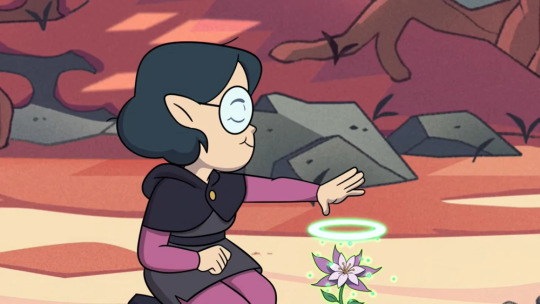
[id: a screenshot of Willow from "I Was A Teenage Abomination", depicting her sitting on the ground while casting a spell over a small, pink flower. /end id.]
I’m also not going to claim that the colour green Belongs To Aromantics, and therefore that All Plants Are Belong To Us, but in tandem with everything else I’m about to cover, the connection between Willow and plants seems like a fairly plausible nudge to a relatively common element of aspec humour.
“Half-a-witch” Willow and the Late Bloomer Experience
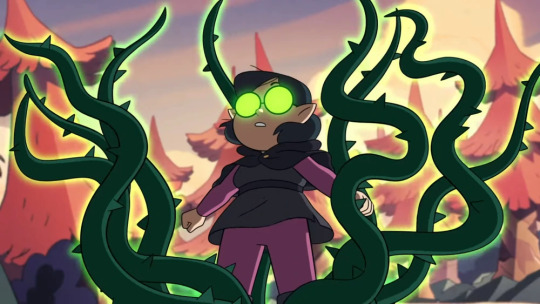
[id: a screenshot of Willow with glowing green eyes, from "I Was A Teenage Abomination", depicting her summoning a mess of thorned vines. /end id]
Willow is literally nicknamed “half-a-witch”, in reference to her supposedly incomplete state - this is a sentiment eerily reminiscent of the pressure to find one’s “other half”, which affects aspec - especially aromantic - people particularly profoundly. She’s considered a late bloomer, someone who hasn’t reached the societal milestones of growth at the expected age, and who is derided and considered immature as a result of this perceived failure. However, we quickly discover that Willow is, in fact, an exceptionally competent and powerful witch - taken out of the restricting frame of the Abominations track, she’s able to grow into her own, “complete” person, therefore proving that she was never really lacking in anything in the first place. Like real-life aroace people, she was perceived as limited and immature based on the expectations and judgements of other people, but Willow was never deficient in anything, least of all herself.
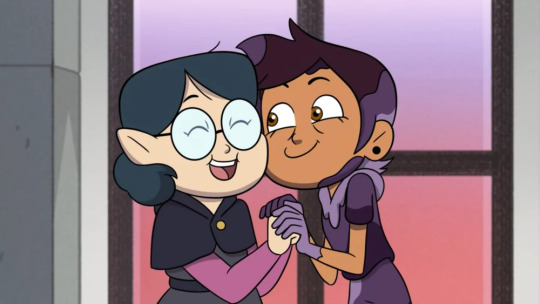
[id: a screenshot of Willow and Luz from "I Was A Teenage Abomination". They are holding hands - the former is laughing with her eyes closed, and the latter is grinning, while covered in abomination goop. /end id]
As far as symbolism goes...the track Willow is initially put in literally requires her to conjure up another humanoid entity, with the expectation that she will therefore prove herself to be a whole and mature person. Only with this ability, she’s told, will she be successful and happy as an adult. The shapelessness of her attempts at conjuring an abomination reinforces this connection in my mind - if I may reference this quote from Ducktales 2017‘s (absolutely stellar) A Nightmare On Killmotor Hill, in which the protagonists explore their own subconscious fears via. the dream realm, for a second:
“I think that’s supposed to be my romantic interest, but I’m too threatened by the concept, so it never takes shape.”
A lot of young aroace people find themselves in situations where they attempt to convince themself of their interest in someone in an attempt to be “normal,” or end up lying in response to family members or friends’ questions about crushes. While Willow’s abominations, first and foremost, represent the expectations from her school, classmates, and family to be a successful, “complete” witch with a profitable future, I think that with an aroace interpretation of Willow they could also very easily be read as representing some latent insecurities over a lack of attraction, or pressure to find a significant other.
(I’m not condemning Willow’s dads, by the way - they seem like perfectly lovely fellas, and I’m confident that they were doing what they thought was best for her. They’re certainly very quick to drop everything to assure her future in Escaping Expulsion, so obviously they care about their daughter very much.)
Greens, Blues, and Yellows: Colour-Coding Willow Park
A while back, I made this post comparing Willow’s palette to the aromantic and aroace flags:
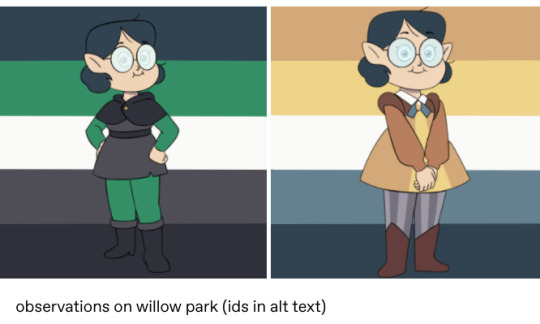
[id: a screenshot of a post depicting the aromantic and aromantic asexual flags, colour-picked from images of Willow in her Hexside uniform and casual dress respectively - these are overlaid on top of the flags. The caption reads "observations on willow park". /end id.]
The grey-and-green aromantic flag has long been the accepted mainstream symbol of aromanticism, and, as the above post - and many others - demonstrate, Willow’s palette reflects it near-perfectly. This could easily be a coincidence, owing to the palette of the standard Hexside Plant Track uniform, as well as her hair and eye colours - which are obviously supposed to be reflective of her plant-related abilities. However, given how fond of employing hidden meanings The Owl House has shown itself to be, I don’t think it’s far-fetched to claim that there’s at least a chance that her palette was constructed with the flag in mind.
The latter is...a bit more problematic for me, although it’s fun to joke about. The blue-and-yellow aroace flag was only created in December 2018, relatively late into The Owl House’s initial production, and it’s still relatively obscure, although on the rise in popularity as the accepted aroace flag (I only recently started using it myself), so I don’t know if Willow’s casual wear is enough to verify the presence of any deliberate subtext. I think it’s a fun coincidence, however, and (as was pointed out in this post) it’s cool that these blue and yellow stars surrounding Willow occur in the same frame as Luz’s bisexual decor:
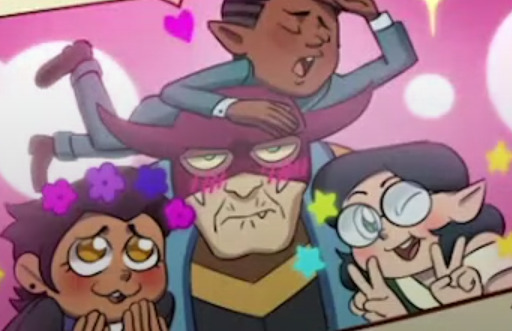
[id: a photograph of Luz, Gus, and Willow, all surrounding a disgruntled-looking Principal Bump. Luz has flowers in the colours of the bisexual flag decorating her hair, while Willow is surrounded by bright blue and yellow stars. /end id.]
also seen above: powerful bi/aspec solidarity
Conclusion:
Do I genuinely believe that Willow is being deliberately written this way? If you’d asked me, say, two months ago, I’d have said probably not - as far as queer representation in kids’ cartoons has come, it has a ways to go, and focusing on transgender characters seems like a more obvious (and equally invaluable) route to go down. I can name maybe five explicitly aspec characters off the top of my head, two of whom have been written as alloromantic and/or sexual in adaptations or continuations of the source material (I have...some grievances with 2005 Doctor Who). But the emergence of Raine, an explicitly nonbinary character on Disney Channel, has given me a little spark of hope, and so, even if it’s never confirmed, it’s comforting to be able to see a character with such strong elements of aspec coding and think to myself, just maybe, that there might be some intent behind it.
I also...really want to see interesting things done with Willow. We’re halfway through Season 2, and despite some promising setup for her arc in the Season 1 finale, she’s sort of been left by the wayside lately in favour of developing the more “plot-relevant” characters, such as Luz, Amity, Eda, and Hunter. Frankly, I think it’s a disservice to her Season 1 development, despite how much I adore all the characters I just listed - beyond any personal motivation, the prospect that Willow could be aroace adds a lot of sorely-sought depth to her, and, as detailed, a lot of this has already been set up in her earlier episodes. I just...I think it’d be neat. Rarely do you get a kids’ show so brazenly queer in its themes as Owl House, and aspec people deserve to be included in that.
Willow would also be great aroace representation because, well - those five or so aspec characters I mentioned being aware of are all white or “raceless” (...also written as white, basically), and so an aspec Asian character would be a really lovely step forward in this area. Additionally, all the characters I referred to are also conventionally skinny, and Willow is not only fat, but written in a way that doesn’t treat this feature as a caricature. People who are more knowledgeable on these topics than I are absolutely free to make additions, as is anyone who feels like I’ve left certain details out.
tl;dr: Willow’s association with plants could be read as a cool nod to aspec humour, her “late bloomer” narrative is eerily reminiscent of some common aspec experiences, her palette speaks for itself, and it’d be really cool if we could diversify the so-far fairly bland sphere of aspec representation.
I’m going to conclude this by linking Rose by The Oh Hellos, because they’re my favourite band, they share The Owl House’s initials, and I also think it’s a good Willow song. Peace out.
youtube
#the owl house#willow park#pspspspsps you will read my 1.5k word aroace willow essay#hooting#meta#willow#aroace willow manifesto#fuck it. this is getting posted
35 notes
·
View notes
Text
LGBTQ Manga Review – Yuri Is My Job Vol. 1-5

Yuri is a genre deeply rooted in its history and traditions. Dating back over a century, many of the scenes and situations from early "Class S" literature still predominate Yuri titles today. Common elements include senpai-kohai relationships between a bright and cheerful younger girl and an older, more assertive upper-classman. The bonds between the two were not the romantic and sexual love of lesbian narratives, but more sate or "pure" relationships often devoid of lesbian identity or attraction. The presence of S elements ebbed and rose over the past century, but they experienced a surge at the end of the 20th century. Contemporary S literature dominated the Yuri scene for at least a decade, and even now, its effects are still seen in many works today.
Naturally, as with any genre that becomes too entrenched with tropes or clichés, Class S literature became the subject of parody, commentary, and deliberate defiance. And while numerous works have repeated, twisted, rejected, and exaggerated tropes, perhaps none have done so quite as masterfully or as enjoyably as Miman's Yuri Is My Job! The series uses S Yuri's ideas uniquely and masterfully weaves a narrative in and out of them with a layered setting and great characters. The constant balance between and integration of reference, humor, and a strong core narrative had me gleefully enthralled and thoughtfully pouring over every page. I ravenously consumed the series, not just because of the cute cakes and elegant young women, but because I was so invested in the story and intrigued by the manga's premise.

Breaking down every reference is far too daunting a task that frankly deserves its own dedicated article. Still, to briefly overview, Yuri Is My Job! is set primarily at a café themed after an all-girls mission school, Liebe Grils Academy. The servers of the café act as the elite students of the fictitious academy and offer outside visitors, patrons of the establishment, a glimpse into their forbidden world of elegance and sisterly love. The series follows high school student Hime after she starts working at Liebe after accidentally injuring the manager, Mai. The series takes off from there, with Hime participating in the various themed events and navigating challenging relationships with coworkers, including her hostile schwester, the upperclassman who mentors her, and, in the world of the café, partners her.
Yuri Is My Job! is much more enjoyable with an understanding of S literature and themes, as references can slip by readers otherwise. However, particularly after the first volume, the series opens up a little more with an overarching plot that dips in and out of the thematic S material. Even without a grasp of S tropes, readers can enjoy watching server Kanoko struggle with her hidden affection for Hime or get caught up in the excitement and scheming during a popularity competition between the staff.
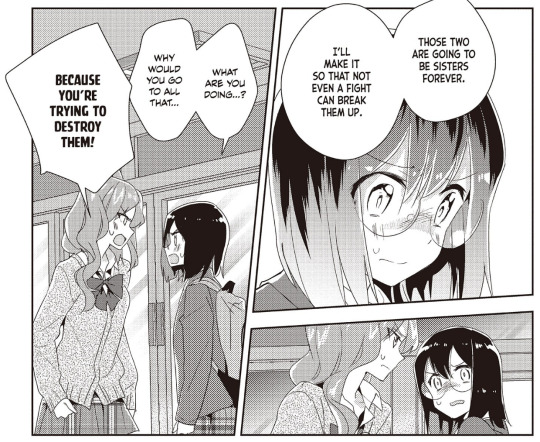
Throughout the first five volumes, multiple shorter narratives, such as the cook getting sick or Hime learning how to serve guests, are interwoven with the overarching character and relationship-driven story. Although almost every character has plenty of time to shine and distinguish themselves, the main plot revolves around three characters, Hime, Yano, and Kanoko.

Hime, the protagonist, maintains a constant facade of the sweet and beloved princess. However, her adorable and charming act is just that, and only two people in her life know her secret, Yano, and Kanoko. Inside the café, Yano acts as Hime's "onee-sama", holding her close and praising her to the delight of Liebe's patrons. However, she is terse and often angry with the girl, unable to move beyond a misunderstanding in their shared past and her insecurities about Hime's true feelings. Kanoko however, acts as a foil to Yano. She relishes Hime's facade, specifically in that she is one of the few privy to the truth, and harbors an attraction to her; she hides these feelings rather than wear them on her sleeve as Yano does. The dynamic between these three drives much of the "action" in the manga.

The more I read Yuri Is My Job! The more I was able to see and appreciate the distinct patterns of storytelling and how the main plot is woven between three layers. The first, and most prominent, is inside the café, in a world dominated by S tropes. Here, characters play politics and plot against each other using their performance and the audience's reaction. For example, thinking how they will get votes for themselves or others during a contest, or else Hime acting cute and loving around Yano, forcing her to return the affection to maintain their roles as schewstern. Outside the fictional world of the café, elements of the story alternate between more grounded drama and thematic moments featuring Yuri tropes. Miman beautifully navigates the relationship between the plot and the parody, weaving a delightful story in and out of different classic Yuri scenarios.
Miman matches this creative story and setting with excellent artwork. Character designs are distinctive and well constructed. So much, that when characters say something "off-screen", a small sketch of their eyes and mouth in the speech bubble is more than sufficient to identify the speaker. Of course, the robust and developed personalities also assist here, as most lines are easily attributable thanks to solid writing and strong personality. The art also features very creative paneling, with almost every page having an entirely different layout. However, the order is still easy to follow and reads naturally.
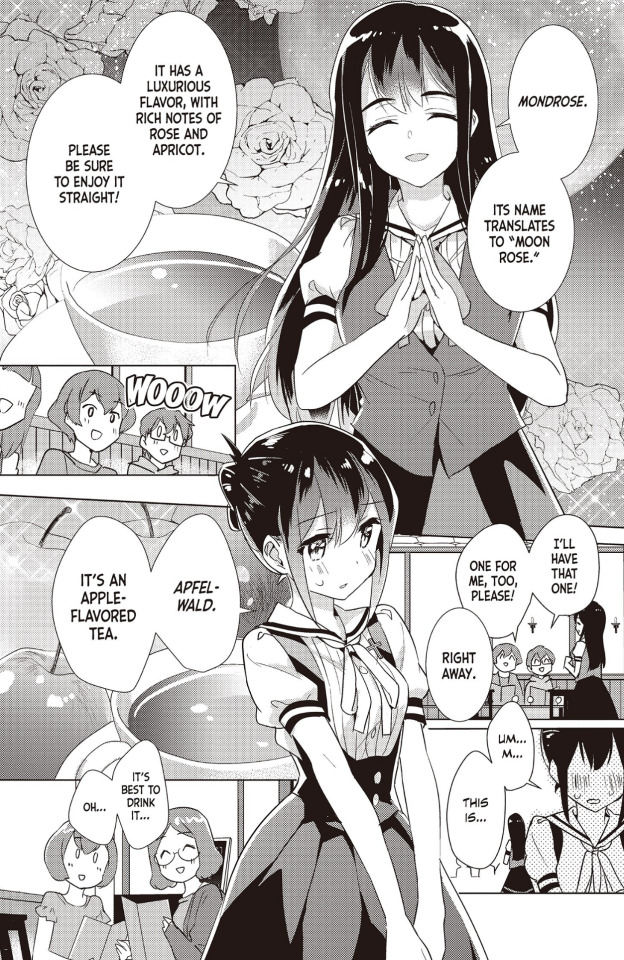
Not only is the art pleasing to look at, but it also adds to the manga's setting and parody of Yuri tropes. Panels feature the girls holding each other in dramatic and literally flowery poses, like a shot straight out of Strawberry Panic, complete with a backdrop of lilies. Appropriately, these fantasy-inspired poses occur in the café, often to the pleasure of adoring patrons screaming in celebration (thus mirroring my reactions). Like the other Yuri tropes, these artistic presentations occasionally jump outside of the café in more emotional or poignant moments. However, in a few crucial scenes, those more related to the narrative when it steps outside the boundaries of Class S, feature more grounded, although still dramatic, art. A particular shot in Volume 4 where Kanoko confides her hidden feelings to her senior, Sumika, and is comforted, sticks out in my mind just for this reason. It is a perfect example of art assisting the themes of the narrative and changing to suit the situation.

Yuri Is My Job! focuses mainly on Class S style storytelling, and thus, while it has plenty of traditional Yuri imagery, there is a starkly limited amount of lesbian content. Sure, readers can enjoy a decent number of illustrations featuring girls holding each other in a dramatic pose, but this is the act put on for the cafe, which is copying the "practice" relationships of S literature, themselves devoid of lesbian attraction. It is an imitation of an imitation, not queer content. Of course, this is by design, but it does mean that if readers want a grounded lesbian romance, they will find the series lacking. A bit of lesbian content does exist, Kanoko's crush on Hime exists outside the boundaries of work and S tropes, a relationship told in a flashback was, at least to one of the characters, "real," and there are signs of an eventual romance. However, the lack of lesbian identity should not be a reason to avoid this excellent manga.

Yuri Is My Job! is one of the most brilliant and exciting Yuri works out there. The ways Miman plays with the tropes and expectations of the genre are hilarious, complex, and exceptionally compelling. The characters are exciting and watching their stories weave through different classic Yuri scenes and tropes is as breathtaking as it is enjoyable. My sincere thanks to Diana Taylor, and Jennifer Skarupa and editor Haruko Hashimoto, for so deftly translating this series and preserving the S ties. I cannot wait to visit the students, or rather employees, of Liebe Girls Academy, in Volume 6.
Ratings:
Story – 10
Characters – 8
Art – 9
LGBTQ – 3 (Yuri 10)
Sexual Content – 1
Final – 9
Review copies provided by Kodansha Comics
Get Yuri Is My Job! digitally and in paperback today: https://amzn.to/3gNNeRt
Buying manga helps support developers and publishers. YuriMother makes a small commission off sales to help fund future content.
#yuri#lgbt#lgbtq#lgbtq+#queer#gay#romance#manga#art#reviews#yuri is my job#lesbian#shoujo#comics#literature#girls love#wlw
394 notes
·
View notes
Note
Hello! You mentioned reading Piranesi a few months ago and I finally got around to reading it and I love it so much - thank you for the lovely recommendation <3 If you don't mind can you talk a little about what you loved about the book (I love hearing your thoughts)? Also have you read Jorge Luis Borges' Ficciones (I believe it inspired Piranesi)?
HELLO my friend!! first of all tysm for taking the recommendation, I'm so happy it worked for you! honestly what do I NOT love about this book? it's hard to wrap my thoughts about piranesi because it was such a lovely reading experience which i honestly need to repeat ASAP because the layers to explore in piranesi are so numerous. secondly let me admit that i haven't read any borges yet BUT he's definitely on my radar and I've been looking for his books on my used bookstore runs since i read piranesi, not to much avail unfortunately but i added ficciones to my tbr for reminder!!
anyways I'm gonna stop right here for anyone who has not read piranesi yet because i think you'd benefit from going into it not knowing much except that it's told in vignettes and that it has elements of mystery which become more and more central to the plot as we advance and unravel the world that piranesi lives in. so don't keep reading past this if u haven't read piranesi yet! i did keep it spoiler-free though so no pressure. also putting everything under a read more bc i truly was obnoxiously verbose adlkjglsjk if it didn't work my apologies 4 it
NOW let's talk about what i loved about the book which honestly will probably just be a flimsy overview bc again i think a re-read would make what i love about it more salient and richer but i guess we can already have a start here!
first of all, the character of piranesi. when i first started the book and immersed myself in his inner voice, i was kind of thinking ok there must be a reason as to why he is so incredibly wholesome but also with an extremely sharp mind and immaculate observation skills. the childlike wonder of his perspective was an absolute joy to read from but also provided some tension because i think pretty early on you catch that he might be a bit of an unreliable character and that what he tells you may not match the reality of what his experiences and observations mean to the reader. you're very much the prisoner of his limited perception, his sometimes bizarre but always delightful thought process, and also again the childlike wonder with which he observes the world and which makes everything carry so much more weight w/o resorting to pompous/pretentious gravitas. a statue isn't just a statue to him, it is the Statue, something important in and of itself, with its own story/mythos and it harkens back to a child's point of view which hasn't yet been shaped by the world and therefore isn't as limited as our jaded adults' minds, even though he is an adult himself, which is apparent in his very keen mind.
then we have the form, with the novel being told in vignettes. i personally really like novels such as these because they feel a lot more personal but also propels the story forward. I'm not a fan of huge chapters tbh because my attention span is trash lmao. it was so easy to immerse myself in his world because the writing was so vivid and honestly made me reevaluate a lot about myself adjdjslg. I'm not much of a quote person but "the Beauty of the House is immeasurable; its Kindness infinite" lives rent-free in my mind because 1. it appears at two key points in the novel and both iterations echo the other brilliantly in their respective context and thus add even more meaning to the quote and 2. i think it's a beautiful metaphor for the world we live in, which leads me to the next point
what i mostly clung to during my reading experience was the theme of confinement to a specific physical space, which can feel suffocating and limited. susanna clarke suffers from a chronic illness that has kept her within the confines of her home for many years and this book very much reflects that. from my personal experience with that theme, i was less reminded of how thematically relevant it was in the middle of a pandemic, and more about how much goodness there is still in this world at a time where everything seems so bleak, and unkind. i myself suffer from an ugly case of chronic cynicism which i think is very unappealing lmao but at least I'm self-aware! being reminded that we live in a world where kindness is indeed infinite in the smallest and biggest of ways is the balm that my shriveled soul truly needed. i guess it's my emotional support quote lmao.
then we have the setting of the book which, while limited spatially, is also so full of wonderful things and imaginative configurations that i was just in awe of everything that was being done with it. the plot is closely tied to the setting and i really want to keep this spoiler-free (just in case) so I'm not going to delve too deeply into it but i'd love to visit this place and have piranesi guide me through the labyrinth of the House and the many wonders (and tragedies) that it holds.
finally we have the MYSTERY and omg i love picking up the clues and kind of forming my own theories along the way bc it truly isn't an in-your-face mystery like a thriller would be. we buddy-read this with some ppl from the book club so the experience of sharing our theories made it all the more pleasant. i really loved how clarke presented the many mysteries of the story in such a subtle yet gripping manner that soon i was just obsessed with knowing who was whom and what they wanted from piranesi and who piranesi was and how this all came to be. all the different players felt fully fleshed out and made me feel veeeery strongly (i.e. i wanted to kill some of them like literally daydreaming about choking them to death... not to sound unhinged or anything). they provided such good foils to piranesi's inherent goodness and all that they lacked in terms of decency. their shamelessness and infinite greed and how they see piranesi as a pawn to use set my teeth on edge so i was just biding my time for the karmic retribution that they'd get akjdlkgj also great exploration of how ambition can be the downfall of mankind
then we have all the clever-people-themes of neoclassicism and philosophy and plato's cave and whatnot and it's not what held my attention so i can't speak much on it bc I'm not one of those clever people who picked upon these themes LMAO but I'll for sure spend more time unpacking these layers on my re-read of this book because there are so many smart ideas hidden in the nooks and crannies of this story that i think you could get something different from each read, kind of like i feel about pride & prejudice by jane austen which offers me new delights to enjoy upon each re-read.
honestly i have so much more to say about how religion is handled, the rituals surrounding grief and their importance in the celebration and respect of of life, birds being amazing creatures, identity and how it can create contradictions etc etc but at this point i might as well just write a college essay on literally every theme explored in this book because it was just SO GOOD! thank u piranesi for me life
tl;dr this book made me feel like my brain was buried in a thick coat of dust and let some much-needed air in
#also i read this message at like 6am and thought long and hard about it#and then started crying bc i'd die and kill for piranesi period
11 notes
·
View notes
Text
winter guard #1 or WHY AREN’T YOU FLYING THE PLANE?????? LIKE I’M SURE YELENA IS A FANTASTIC PILOT BUT YOU LITERALLY HAVE ONE SKILLSKET THAT SUPERCEDES ALL OTHERS AND THAT’S YOUR FUCKING ABILITY TO FLY A PLANE MY GO D-

Leads: Alexei Shostakov aka Red Guardian & Yelena Belova aka White Widow.
Characters: Carol Danvers, Black Widow, Crimson Dynamo, Red Widow, Vostok, Perun, Chernobog, Vanguard, Darkstar & Ursa Major.
Mentioned: Jennifer Walters aka She-Hulk.
Teams: Winter Guard & Avengers.
Programs: Red Room and Wolf Spider Spec Ops.
Written by Ryan Cady
Background: Jennifer Walters aka She-Hulk was arrested by the Winter Guard for crimes against the Russian government, assumed kidnapped and tortured, and any agent affiliated with the Russian intelligence community who disclosed anything about Walters’ arrest will be prosecuted or otherwise punished by the Russian government. The Avengers are incredibly invested in finding Walters and opposing the Winter Guard.
We start off in the Avengers Secure Holding Facility in an undisclosed location in the Pacific Northwest. Yelena Belova is being interrogated by Carol Danvers under suspicion that she worked with the Winter Guard involving Walters’ arrest.

The Wolf Spider Spec Ops group attempts to break her out in order to capture or kill her for her assumed admission to the Avengers regarding Walters and she escapes in the process. Before a Spider can kill her Black Widow gets her out on the back of her motorcycle (this is sapphic culture we stan) and takes Yelena to her San Francisco Base of Operations where Natalya informs her that the Winter Guard is at war with the Avengers and that her reluctance to join sides means she will continue to be a Person of Interest to the Avengers.
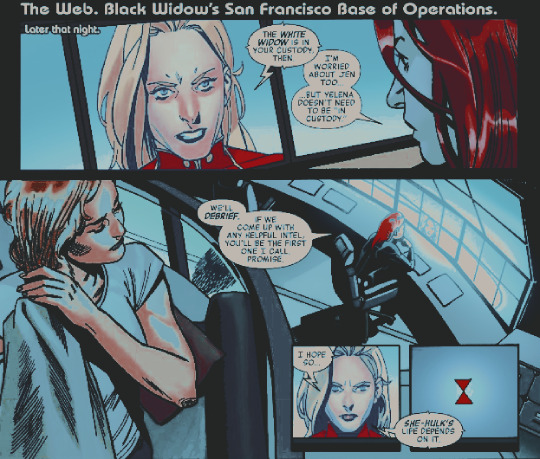
(She’s referred to as the White Widow multiple times??? I’m not sure what the basis for this is, I haven’t read enough comics with Yelena to know if this is a new thing, but it does put her in direct thematic contrast to the main baddie of the comic: Red Widow. However the whole Black Widow, White Widow, Red Widow thing is giving very much Suess energy.)
Yelena discloses to Natalya that she’s working alongside Alexei because they have similar interests in the motherland and that their mission did not involve anyone else, including the Guard, or at least it wasn’t supposed to. She doesn’t want any of the Guard dead. Her relationship with the Guard here I believe is supposed to be a reference to the broader theme of Yelena’s (& many Russian people’s) complicated and nuanced relationship to her homeland as well as a storyline that hasn’t been revealed yet.
Mikhail, Ursa Major, is revealed to have been killed, although not by an Avenger, but at the hands of “Red Widow,” a mysterious Red Room graduate that Natalya describes as possibly inhuman. The main story of the comic begins as Yelena agrees to tell Natalya why “Alexei and I went home...and why I do not hate the Winter Guard.”
Three weeks before...
Yelena and Alexei are working together to break into a highly secure base in order to steal mission details for something called Operation Snowblind, the Red Guardian’s last assignment.
Red Widow is shown working for the Security Council and leading the Winter Guard.

As she’s assigning the task of hunting Yelena and Alexei down she describes Alexei as the U.S.S.R’s “failed response to Captain America,” “declared MIA after the Cold War,” and “resurfaced in the United States after rotting away for years in prison.” But also frames him as a childhood hero for most of those present at the meeting. She describes Yelena as “Yelena Belova aka White Widow, aka Black Widow, aka the Red Room’s second biggest mistake.”
There’s a throwaway line where Red Widow mentions that the Winter Guard doesn’t question orders. But several members like Darkstar, Crimson Dynamo (the defacto leader), and Ursa Major express discomfort at their assignment.
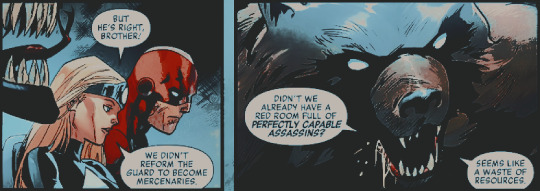
Crimson Dynamo aka Dmitri Bukharin comments that hunting down Yelena may be in their purview but that Alexei was a national hero and he didn’t agree to lead this new iteration of the Winter Guard to be a hit squad. Vanguard aka Nikolai Krylenko seen above in red, says Alexei may never have been someone to idolize and if he was, that person is long dead and that those who looked up to him should be the ones to bring him down anyway.
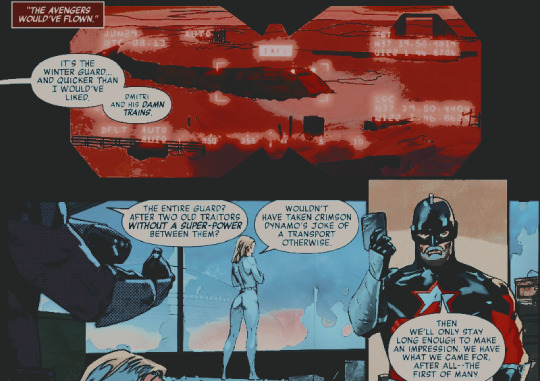
Alexei and Yelena recover the hard drive containing information on Operation Snowblind. Yelena is skeptical of the hard drive’s worthiness of the impending fight with the Winter Guard and Alexei responds with the Russian proverb: “What the pen writes the axe cannot erase.”
Yelena engages the Winter Guard while Alexei secures an “exit strategy.” The only remarkable thing from the fight was this weird interaction between Mikhail and Yelena (and yes, Mikhail, as in the guy Natalya said the Red Widow killed 3 weeks from now):

I’m holding out hope but the stereotyping so far is either purposeful in order to be refuted and used later but right now it’s in place of Mikhail having an actual personality. I have no earthly, yawning fuck why it was necessary to mention that Yelena smells like Alexei in this other than bearlore but ok. Reading forward this dynamic can be inferred, at least to me, as a very close friendship or allyship that eventually turned adversarial as Mikhail and Yelena continue to snipe at each other’s choice of work:
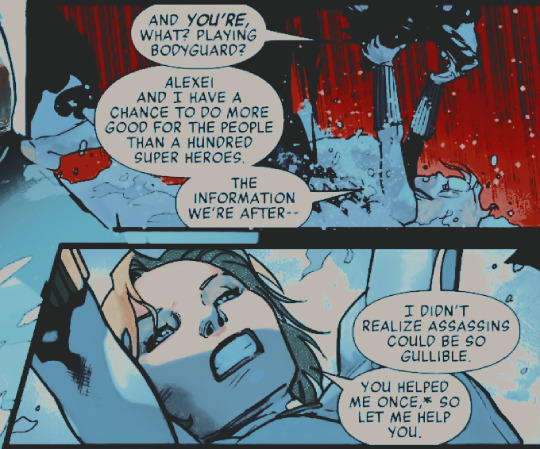

This is interesting twofold: one, we have no idea what Operation Snowblind is and why it would make Yelena choose to forgo her usual operational mystique in order to obtain the hard drive, but from what is shown in Widowmakers she’s disillusioned by the government and contract work in general and may be moving onto more loftier pursuits in the name of the Russian people. Two, it’s interesting in a story building sense because Yelena’s love for her country being directly at odds with that country’s love for her is very relevant in modern Russia:
WIDOWMAKERS PANEL 1:

WIDOWMAKERS PANEL 2:
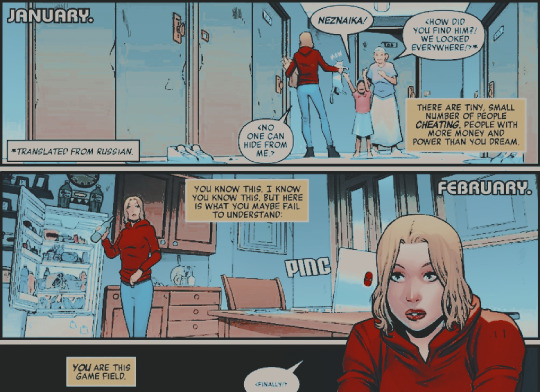
...i digress.
During Yelena’s fight with the Guard Alexei is doing something with the hard drive (???) and is interrupted by Vanguard, who’s wearing an iteration of the Red Guardian’s OG suit, he then boomerangs the kid through a window which was funny. But if I have to suffer through this boomerang again after waiting until 2019 to get a proper shield I’m rioting.
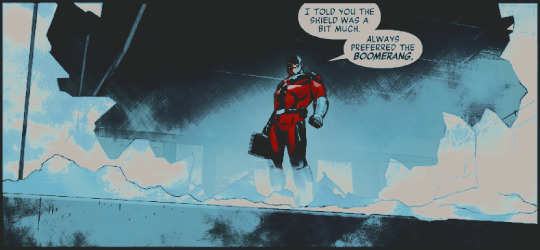
I simply hate him, your honor.
Anyway, Alexei reveals there’s a traitor in the Winter Guard who’s helping him, he then presses a button and blows up Crimson Dynamo. Darkstar appears like she might have gotten to Dmitri quick enough but I think the implication is that he’s dead or critically injured.
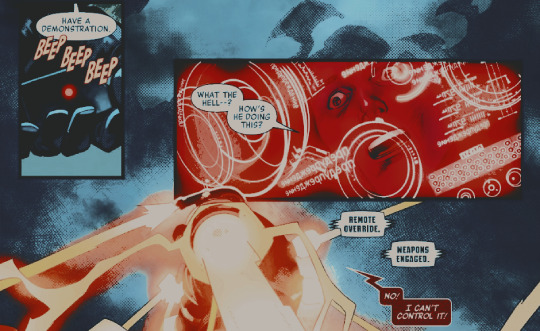
Red Widow pursues Alexei and Yelena as they run to the plane, but Yelena incapacitates her. From the following panel I think that Red Widow and Yelena are going to become dedicated enemies moving forward.

The issue ends with Yelena chiding Alexei for murdering or attempting to murder Crimson Dynamo. From what Alexei says, Operation Snowblind has something to do with the “enlightening of superheroes” which he describes as “rarely a painless process” therefore murder is justifiable, I guess?? It’s still not clear if the spy working with Alexei is Red Widow or someone else entirely.
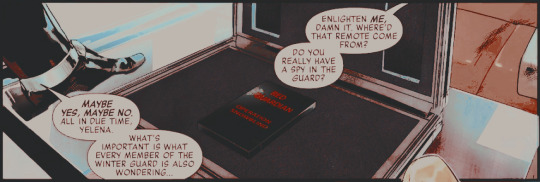
I didn’t mind this issue. Clearly it's attempting to tie in different themes from the film in order to pull in the movie’s audience, but I don’t hate it. What I’m getting more nervous of is another fucking villain arc for Alexei. They appear to be setting him up as a foil for Yelena: Modern Russia vs Soviet Ideals. I really hope this isn’t the case or if it is I hope he’s redeemed in a way that doesn’t involve another death.
The next issue is released September 29.
5 notes
·
View notes
Text
ok so 2ha. vague spoilers ahead (important spoilers are warned but watch out)
that’s a solid 4.5/5 for me. this novel RUINED me and I loved it for it. it made me feel like very few novels (and even stories in general) did. today I’m STILL shaken over a part of it that I read two days ago, despite the happy ending. I have A Lot of thoughts (shout-out to @whateverwuxian who can testify that I couldn’t shut up about it, love you buddy!!) so I just went ahead and [gestures below]
starting with the negative so we can enjoy all the positive later. feel free to discuss but I’m extra sensitive and these are only my personal feelings so they probably won’t change anyway, so be nice please!
what I didn't like:
too many r*pe scenes. I get that the non-con """makes sense""" narratively and thematically but like. they didn't have to be explicit. at the very least not all of them. sorry but too much is too much. there are more non-con sex scenes/flashbacks than consensual sex scenes! stop! we get it! enough now!
not a fan of a 26yo falling in love with a 16yo. if cwn had initiated Anything I would’ve thrown the novel out the window. but thankfully it didn’t happen, I got invested, and nothing mutual happened until mo ran was 22, so I mostly got over it, but I’m still somewhat uncomfortable with it for very personal reasons.
their first time putting it in. it felt so unfair and I was very upset over it. it could’ve worked without going There? why. was that necessary. and it's heartbreaking for both of them, because mo ran didn't want to do it either. he wanted them to take all their time. he wanted to go step by step. all he wanted was to make sure cwn would be happy and comfortable and never hurt again in bed. for their first time that way he wanted it to be special. but it was just. taken away from them, and for what? for nothing there’s absolutely no reason for it. I get there’s the metaphorical foreshadowing of the upcoming reveal aspect (spoilers) both of them not consenting, mo ran being horrified -> the reveal that mo ran was cursed and so would’ve never wanted to treat cwn like this in the past either if he’d had control (end spoilers) but still?? and it’s never brought up again? I know they don’t get the time until the very end but hhhh. yeah I have Feelings over this
some plot twists hit good emotionally but had no point? thinking of the one about xue meng here.
there’s horny, and then there’s mo ran. it’s not a bad thing, it’s just not the kind of stuff I like reading about and book 1 and 2 are A Lot on that side so in book 2 after a while ME, THE BIGGEST ASEXUAL WHO COULDN’T CARE LESS ABOUT SEX SCENES, WAS LIKE, “oh my god have mercy please just fuck already I beg of you” and indeed they chilled a bit after that. like they were still horny but. less intensely and less all the fucking time. thank god (I still think the farm arc was hilarious to witness though, and I did love it)
kinda wish their reunion at the end was longer and more emotional but that’s just because I love that shit
(spoilers) kinda wish we got to see shi mei again before he went off doing his blind wandering doctor stuff. a talk with ranwan would’ve been very interesting. (end spoilers)
xue meng didn’t get a hug
that one thing at the end you know the one. maybe I'd be more into it if it'd been given time to be explored seriously and wasn't played off as a joke. it kinda ruined the mood of their last scene for me. (spoilers spoilers spoilers this is the end of this section if you don’t want to get spoiled) in that scene I wanted chu wanning to ride off into the sunset with mo ran, not txj. like, txj is the alternate world’s “if there had been no transmigration” version of mo ran 2.0. the whole point is that mo ran IS txj in book 1, but changes and becomes mo ran 2.0. mo ran 2.0, who by the end of the novel has already done all the redemption and deconstruction of his dubious habits. who he was as txj is long behind him. at this point txj will always be a part of who he was, but they are pretty much two 'different' people now. txj disappearing into dust after everything that happens at the end was beautiful symbolism. it meant something. to me there was no point keeping txj around after all that other than for “haha split personalities fighting over cwn’s attention uwu” THAT SAID the fact I'm not a fan of the idea doesn't mean I don't like txj. I care txj a lot and have Emotions over him, and I will definitely eventually explore this in my writing
(still spoilers) the demonic blood reveal was a bit.... deus ex machina? plus I personally would've preferred mo ran staying a regular person (end spoilers)
alright what I liked now:
the themes, both regarding the characters and the various plot elements. this novel really challenges your morals and what you think is right or wrong, what’s redeemable, what’s punishable, and how much one relies on first impressions, amongst other things. this novel is the definition of “don’t judge a book by its cover” but also “look further than the first page” in so many ways
the romance. like I don’t need to say anything there. just, the slow burn, the longing, the yearning, the romance [clutches heart]
the plot twists/reveals. I’m so glad I was barely spoiled (I was spoiled two Big things but very vaguely so I was still surprised) because pretty much all of them had me shouting “WHAT” and/or gaping and/or various “what the fuck!!!”/”holy SHIT”/“NO” reactions
the way a lot of those reveals just completely change your view on things/characters?? that’s my jam
wontons. that was the first time I cried and my first very physical reaction to an event in this novel. I literally felt like time froze. I heard my heart beating. it was painful but AMAZING.
might be nothing in the grand scheme of things but honestly, all the food! I love that mo ran is an excellent cook and can make all those delicious dishes for cwn. as someone who loves to cook for their loved ones I think it’s so lovely that he gets to do that
the character growth. for everyone, but mo ran in particular? like I just. I started off not liking mo ran very much, straight up despising him at times, and in the end I was fucking sobbing over him and cried myself to sleep only to wake up in the middle of the night to cry some more so there’s that
chu wanning? there were aspects of him that I related to heavily, and that felt both like the Mortifying Ordeal of Being Known and very special because it doesn’t happen to me that often
the whole deaging arc. that was deaging done right and it had a purpose in the narrative and their relationship growth, I was “!!!!”
I LOVE how they took their time with EVERYTHING once they got together? that it spanned over several weeks? that it started with the confession, then just holding hands, then kissing, then making out, then sex, and even the sex was step by step! it said A LOT about mo ran’s character growth and it respected SO MUCH the fact that cwn is a 32yo (unrelated but (spoilers) I like to argue that yeah he’s been alive for 32 years but when you’ve been asleep and not aging physically nor growing mentally for five years in a way that makes you a 27yo. so when he calls his body “mature and old” and compares himself to shi mei I’m just. buddy your body is just three years older than shi mei’s there’s barely any difference in maturity right there. I know it’s your lack of self-worth speaking, and believe me I get it, but don’t be so hard on yourself. (end spoilers) anyway, this is an unimportant and unrelevant thought that I had during the mirror scene) who has no experience in any of these things whatsoever. he's not pushed into sex like he's going to be comfortable right off the bat and like it isn’t such a big change in a life that’s been ascetic so far. mo ran is aware of that! and when they have their first time mo ran, who’s been maybe even more horny than cwn all this time - seriously horny is that guy’s middle name, who initiated the sex, what does he say!!! "don't worry about me, tonight, I just want to make you feel good"??? mo ran?? your character development??? I appreciated that so much.
the pain. I’m still bleeding on the floor despite the happy ending but yeah. I like angst and I was not disappointed. it didn’t feel that gratuitious to me, more like, brutally honest? I don’t cry that easily but by the end I think I’d cried, what, close to ten times??
quite a few excellent quotes [lies down] “I realized - I had grown into the you in my heart”?? “hell is too cold”??? I highlighted more but those two are the ones that always come to my mind first
most of the time the flashbacks were perfectly inserted for maximum emotional damage and I respect that skill
xue zhengyong. like he’s not my favourite, my favourites are xue meng, nangong si and ye wangxi but? I just adored him so he gets a special mention
the side characters? like, I legit loved Everyone? when I cry over side characters you know it’s serious
THE CONFESSION SCENE. LIKE. HOLY SHIT MY HEART. it comes reaaally close to the vocal one (because hua cheng confesses so many times without words) at the end of tgcf for me. it was beautiful. I was so emotional. the fact that cwn can't say it no matter how much he feels it. like it's always been plain and clear just how much he loves mo ran. but he can't say the words yet and I just. the fact that mo ran gets it? that he doesn't need the words, just that squeeze of fingers, just what cwn is, at that moment, able to give him, and it doesn't mean less to him than words would? it hit home real hard
unless I think of something else, that’s about it! I can’t recommend 2ha enough, that said, I beg of you, heed the warnings. they are NOT overstated. and even if there were no warnings, take care anyways. the angst is serious, it haunts you. angst always makes me feel like my chest is being squeezed and that’s precisely the feeling I’m looking for when I choose to read angst. I have good tolerance to it, so despite not doing entirely well lately, I thought I was tough and went for it, but I’m a CLOWN. the way it’s written ruins you. this morning despite reading the hardest part of the angst on saturday evening, I still had some physical chest pain. so I recommend it with all my heart, but take care of yourselves. 2ha doesn’t fuck around.
#2ha#bee talks#i will probably tweak and add to this post over time because I probably forgot stuff#anyways I'm gonna go lie down and cry over ranwan as I think about my fic ideas#2ha review
67 notes
·
View notes
Note
do you like pirates of the caribbean 4? I always see some people from the fandom of potc saying that they don't like it but I love this movie, so if you don't like it can you PLEASE explain to me why most of people of the fandom don't like it?
Okay so I don’t think the movie is like. good, and I had a lot of shit to say about why which will be under the cut but I do want to stress before I start, that there’s a lot to enjoy about ost. The characters carried over from previous films are still recognizable, if we’re to compare to dead men tell no tales. Furthermore, the score absolutely fucking slaps and the mermaids make me feel things. Other than that, people just like different things, so if you think ost is good then that’s totally fine! This is just what I, personally, don’t like about the movie.
So let’s get started.
I think a big part of why ost fails for me is that jack as a main character is something that sounds interesting on paper, but is really hard to pull off in a satisfying way. Like, the first three movies build him up as genuinely super interesting, and so the fourth movie focusing on him should make for a good main character, but it never really goes deeper into him than the previous movies, which leaves him in a sort of limbo where he fills the purpose of main character but only gets his regular side character development.
To illustrate my point, I like to point to his final decision between saving blackbeard or angelica, or taking the water for himself, because it should by all means serve as the culmination of his character arc. The only problem is, it doesn’t work as an ultimatum if it’s between angelica or blackbeard because no one likes blackbeard, and it doesn’t work if it’s between him and angelica either because it’s just the same ultimatum as the third movie. We don’t need to find out that jack has the capacity to prioritize the people he cares about if it’s a life or death situation, because we’ve already established that. Thus, the whole thing comes off a bit hollow, at least to me.
I think the argument one could make against this is that his character arc is less about learning to care, and more about caring for angelica, but that falls flat too, since by the end of the movie the two of them aren’t any closer. Jack still leaves her on an island to possibly starve to death, which feels like a massive step back from saving her life, especially considering he’s been through that exact situation and inflicting it on someone he supposedly loves kinda sets his intended arc back for me. And I think this comes from disney’s unwillingness to change him as a character, since the classic morally ambiguous bad boy jack is very much what made potc such a phenomena, even if he’s by far not the only part of why the films are good.
Basically, it’s a have your cake and eat it situation for jack, where disney get to feauture him even more in the marketing since he’s the focal character, but don’t actually develop him and risk turning people off.
Furthermore, on the subject of characters I think that basically every new side character is an affront to god, just because they have so much wasted potential. On stranger tides could have done so much with the religious themes present in many of the characters, from blackbeard and the priest’s conflicting worldviews in terms of faith, to the priest and angelica having conflicting ideas of the same religion, to the spanish being literal colonizers and destroying parts of the local mystique in the name of faith, to jack not being religious and also super queer-coded, to the whole thing about mermaids being the descendants of evil people who couldn’t go on noah’s ark, there’s just SO MUCH that could be done, and it would give ost a very unique thematic edge. The other three films mainly focus on class, so a deeper dive into the already present religious themes would make ost distinct in more ways than “the sequal nobody likes, but at least isn’t dead men tell no tales”
On that topic, though, I would like to return to what I said in the opening, that it’s in some ways much more of a potc movie. I am of the controversial opinion that dead men tell no tales does do some things right, but what it does not do right is jack, who, no matter how underdeveloped he is, is still himself in ost. I’ll absolutely watch it from time to time, because it can be pretty fun! I just don’t think it holds up to the previous sequels when you get down to analyzing.
(That being said, since you say you like it I would absolutely love to hear why because I’m honestly very curious! I think it’s easy to kind of get stuck in the sentiment that ost is unsalvageble since the fandom seems to have come to a bit of an agreement there. So a different perspective is always welcome, and very healthy!)
#ask#pirates of the caribbean#on stranger tides#meta#<- mostly for organisation because it ended up long and i'd like to be able to revisit it in the future
36 notes
·
View notes
Text
As Above, So Below
I’m still trying to pinpoint exactly why the focus on “heaven is fixed and actually a paradise now!” is just so deeply unsatisfying to me. And I think I need to preface this with a bit of backstory about me, because I think that gives the rest of this essay some relevant context.
I know this isn’t relevant to my main point here, but this is a metatextual and thematically identical example of the exact thing I’m gonna lay out, because context is always helpful. So please forgive this seemingly irrelevant detour, because I promise it will be relevant by the end.
(plus, would it really be an Essay By Mittens™ without at least one baffling tangent? no, it would not!)
Tangent time!
I think everyone that follows me knows how skeptical I was... or should I say how WARY I was of the way Eileen was returned to the narrative this season. We were warned in the PREVIOUS EPISODE how much Chuck was attempting to interfere in their lives. I was accused of some very nasty things, of hating the ship, or hating the character of Eileen, or of hating Sam and not wanting them to be happy. No amount of pointing at obvious warning signs in the text, no amount of yelling about Sam’s God Wound or the absolute klaxon warning that the wound had become “quiet” and his Chuck-O-Vision Nightmares had apparently stopped seemed to matter. I was declared “wrong” and told to shut up.
And then 15.09 happened, and basically everything I’d been wary of was shown to be what actually happened, but there were still unresolved issues. Eileen doubted her own feelings and walked away. She doubted what was actually real. And at the time, I said many times that I would be thrilled to see those issues resolved by the end of the season, and for her to truly know that what she’d felt growing between her and Sam was real. And by the end of the season, despite my personal horror at her previous situation (and having that personal horror compounded by the fandom literally gaslighting me and attempting to bully me into ignoring this basic actual plot detail of this specific growth process which... in the context of what my personal objection was to accepting her return at face value in the first place having been personal trauma associated with gaslighting and manipulation...) by the time 15.18 aired, I was 100% convinced that Sam and Eileen had fully chosen each other, and felt the traumatic pain Sam suffered during that text conversation with her during the snap. She NEEDED to come back, because she had been set up to be part of Sam’s Win. They were clearly each other’s future.
The show literally put in all the work to make even *me* feel this to be True and Right and Good. And then after that point we never even hear Eileen’s name again. We never were told that she was even returned at the end of 15.19. Sam, who had been so entirely devastated by her disappearance in the previous episode that he couldn’t even process it was apparently hit with an amnesia hammer and just... never even thought about her again through a long greyscale life with a blurry baby Dean factory vaguely in the background of a single scene of his life. I can’t credit or justify how after an entire year invested in making us all truly care about Sam and Eileen and the happiness they found in each other if only the cosmos would allow them to choose each other in the end would just... erase all of that in the series finale.
Which brings me to the second tangent, which is specifically about *me,* and how I feel about the cosmic order in the television show Supernatural. Because I feel a lot about it. Probably more than most people ever did. And this is also important to understanding the main underlying point I need to make here.
Something I’ve been most looking forward to, for YEARS, about Supernatural eventually ending someday was writing a book, or a thesis, or even just organizing and compiling all my observations into a cohesive narrative specifically about the cosmology of the Supernatural universe. I’ve been cobbling together my observations and realizations about the nature of heaven, hell, purgatory, the empty, the alternate universes we’ve seen, and yes, even the cosmic function of the mundane level of the story as told by events that transpired on Earth. So of everyone watching this dumb show for the last 15 years, I don’t actually know anyone who cared more that I did about finding a satisfactory resolution and transformation of every plane of existence-- the mortal world AND the “afterlife realms” we’ve experienced on this show. And in the wake of the finale, I feel cheated out of that. Because in the end, it wasn’t about the triumph of free will and a flip of the script, it was just more of the same.
And now that I have those two preliminaries out of the way, I’ll finally get to the point. :’D
(hooray, it didn’t even take 1k words to get there for once!)
The “main stage” of Supernatural has always been Earth. It’s always been “Humanity.” At the very start, we meet two men whose lives had always been dictated to them by higher powers. At first, that “higher power” was their father who raised them in his vengeance mission, who trained them to hunt the supernatural. It was the inciting incident of the entire series, after all, their realization that forces outside of their control had irrevocably altered the course of their lives. It had forever torn down what they’d trusted in family, in personal safety, and would become something they couldn’t outrun or fight back against for long before another wave of cosmic discord would settle over them once more.
We watched this story play out in ever increasing spheres of cosmic significance, until Gabriel laid it out on the table for them in the simplest possible terms (in 5.08).
GABRIEL: You do not know my family. What you guys call the apocalypse, I used to call Sunday dinner. That's why there's no stopping this, because this isn't about a war. It's about two brothers that loved each other and betrayed each other. You'd think you'd be able to relate.
SAM: What are you talking about?
GABRIEL: You sorry sons of bitches. Why do you think you two are the vessels? Think about it. Michael, the big brother, loyal to an absent father, and Lucifer, the little brother, rebellious of Daddy's plan. You were born to this, boys. It's your destiny! It was always you! As it is in heaven, so it must be on earth. One brother has to kill the other.
DEAN: What the hell are you saying?
GABRIEL: Why do you think I've always taken such an interest in you? Because from the moment Dad flipped on the lights around here, we knew it was all gonna end with you. Always.
A long pause. SAM and DEAN look down, then at each other.
DEAN: No. That's not gonna happen.
GABRIEL: I'm sorry. But it is.
GABRIEL sighs.
GABRIEL: Guys. I wish this were a TV show. Easy answers, endings wrapped up in a bow...but this is real, and it's gonna end bloody for all of us. That's just how it's gotta be.
***
And isn’t that all even 1000x more painfully ironic that it all still happened even 10 years later? It was always going to end with them. And lol, “I wish this were a TV show” because if it was then it wouldn’t have to end bloody.
But this… was a Major Acknowledgement that the meta level of this story was consistent, and was telling us something important. It demonstrated that the Cosmic Structure Itself was the cause for Sam and Dean’s “destiny” in this story. But that’s not what the point of this story has ever been.
Nobody (including me, who is literally obsessed with this aspect of the story) has ever invested themselves in the narrative of Supernatural because they cared about the fate of the cosmic order over and above the fate of the characters who had committed to overthrowing it all, to “tearing up the pages” and writing their own destinies. I mean, we became invested because Sam, Dean, and Cas as characters took us by the hand and invited us to come along with them as they battled against fate for the good of EARTH and HUMANITY.
And certainly, Heaven being a horrific sort of eternal replay of the “highlights” of individual souls greatest hits, where free will didn’t apply as everyone was just boxed away into their individual holodecks to serve as some sort of giant Heaven Battery powering the furtherance of this narrative, this “cosmic order” that had become so powerful it dictated the events and manipulated the lives of people who still existed in the ostensible realm of free will and human life on Earth… that couldn’t stand in the end. But what the narrative (and people I’ve seen attempting to justify the finale as narratively sensible) seems to have forgotten was that all of that was Chuck’s construct to begin with. That without Chuck holding his kingdom in Heaven together, the walls of all those soul cubicles ceased to even be relevant.
After spending their entire lives to this point constantly fighting their way to the absolute pinnacle of the As Above, So Below narrative and pulling the plug on the original creator himself, Humanity should’ve triumphed. And I’d argue that it DID, through Jack restoring the missing essential “humanity” to the divine condition. And, silly me, I thought they’d achieved the promise of “paradise” heralded by Jack’s birth at last, and truly “flipped the entire script of the narrative.”
Ever since they thwarted the original apocalypse, I had hope that they would continue to achieve the same result right up the ladder. Metatron trying to fill the role of Chuck Junior hit his own narrative wall in TFW, while Dean’s battle with the Mark of Cain, and Cain telling him he was “living my life in reverse” and would succumb to destiny by killing his loved ones in the “reverse order” to Cain’s own path to downfall cemented this for me. Dean not only failed to kill any of his loved ones (you didn’t kill your own brother. why?), he SAVED them. He didn’t fulfil the prophecy in reverse, he subverted it. He UNMADE it.
Perhaps I was thinking on too grand a scale, that the ultimate inversion wouldn’t be “God is overthrown and replaced by more of the same,” but “God is overthrown and the entire order of the universe is restructured from the bottom up rather than the top down.
I’d hoped against hope that the conclusion of the narrative would be “As below, so above,” with the fundamental power of human love becoming the new foundation of the cosmic order. It never even occurred to me that “taking back the narrative to rewrite it for ourselves” was not the ultimate goal of Team Free Will, or the ultimate expression of their biggest win.
This whole “well heaven really needed to be rebuilt, there was still work to be done!” seems… irrelevant to me if they’d truly won free of the cosmic narrative. The entire structure of the universe-- including Heaven and Hell-- should’ve defaulted to the paradise state that Jack was literally born to bring to fruition. Wasn’t that the point of his entire role in the story, ultimately?
And if that wasn’t the case in the end, why did we never learn the fate of Hell? Was it just… irrelevant and unchanged after this? Or just… abandoned as a concept entirely? It’s just strange to me to put such a focus on heaven being the sole sphere of import in the end that it undercuts the essential humanity of the narrative for me.
The story itself had kept Heaven on a back burner for years, only occasionally mentioning that the structure of the place was falling further and further into disrepair with a dwindling force of angels struggling to keep the walls in place at all, that it seems like it could’ve been an afterthought at the end of the series rather than a focus so large it required the death of both main characters to make sure we all understood that Heaven Had Changed Now. Because TFW had never been fighting to make Heaven right. They’d been fighting to save the world itself, for humanity to all have a chance to live their lives as their own.
And we didn’t need to see that in the final hope they might get their own lives on Earth to explore. In the end, the fundamental narrative that Life On Earth was dictated by the cosmic structure of creation was never fully subverted. And for me, that’s the main reason I just… can’t accept the finale. It wasn’t a victory of free will and humanity, in the end it was just more of the same.
I appreciate the attempts to take the essential bones of the story we did get and apply a different polish to the surface of the skeleton, but to me it still feels like we’re looking at completely different beasts in the end. Like… to me this was as jarring a revelation as those drawing of modern animals reimagined as dinosaurs entirely based on their skeletons. Like, all along the narrative told me I was looking at a swan. They told me this skeleton they’re building out from is definitely a swan, without a doubt. I know what a swan looks like-- a graceful feather-covered bird with magnificent wings. I trusted that in the end it would be at least remotely swan-looking. And then the finale ended up looking like this
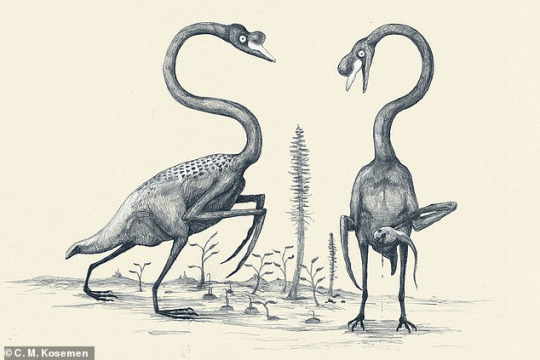
and I just don’t even know where everything went so wrong. Or maybe all along I just assumed they actually knew what a swan looked like, but weren’t sure they could actually pull it off and settled for whatever the heck this is instead. Either way, I’m actually kinda grateful to the finale for being so entirely disappointing on every level, because otherwise I probably would’ve tried to adopt the monstrosity of it anyway. And I’m really, really glad I don’t have to.
#spn 15.20#spn cosmology#heaven hell purgatory and the empty#and this is why no amount of narrative defense of the finale is capable of making me feel any better about it#i admit i thought too big... but it was all right there in the narrative to see#oh well at least all i have to do to hold on to my grandest notion of the universe is throw out the finale :'D
196 notes
·
View notes
Text
Essence of Yakuza Combat, Part 1: Counter
(incidental Yakuza spoilers below)
A lot has been said about the core of what brings people to the Yakuza games and plays a role in keeping them interested, which is the way the series juggles its earnest, straight-faced drama with its, let’s say,


eccentricities.
(I don’t bring these up casually, by the way. It would be almost certainly correct to attribute at least part of Yakuza’s growth outside of Japan to the karaoke minigame and someone at RGG Studio thinking that putting a chicken in charge of real estate would be very funny.)
I wrote a bit about that through one specific example here, and while that is core to the series’ identity, it’s just one aspect of the many, many hours you spend playing a Yakuza game. User aggregated times on HowLongToBeat peg the average length of a Yakuza playthrough somewhere in the area of 15 to 40 hours, and even if you’re not on the completionist beat and ballooning your hour count by spending a lot of time playing mahjong and other minigames, you’re going to spend a lot of time with the minute-to-minute gameplay of Yakuza, which is, by and large, getting into fights with chumps and smashing their heads into various surfaces.

Combat in Yakuza games isn’t exactly known for its mechanical depth. Certainly, if you’re willing to poke at its systems you can achieve mastery and do some wild stuff, but I’d wager most players aren’t particularly interested in getting better at the combat. More than likely, they’re content with getting just skilled and/or strong to get past major boss fights (which are genuine highlights of Yakuza combat) with possibly some help in healing and weapons. Yakuza 0 probably exemplifies this most, as the game gives you the option to upgrade both characters’ Legend styles into utter nonsense.
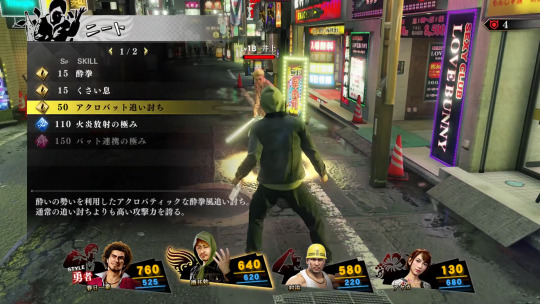
So in some ways, it’s not all that surprising that RGG Studio would make the most of an opportunity to switch combat systems with Yakuza: Like a Dragon. According to series creator Toshihiro Nagoshi, after they floated the idea of a turn-based RPG in a 2019 April Fools’ video, the positive public reception convinced them that changing mechanics could actually work. Which at the time was, and moreso in hindsight is, kinda obvious. Their action combat wasn’t exactly lighting the world on fire, especially with the recent switch to the much more slippery and less weighty Dragon Engine combat in 6 and Kiwami 2, and series staples like random encounters and equippable gear are already part and parcel with more traditional JRPGs like Dragon Quest. Hell, the near universal Yakuza experience of pausing to call a time out and chug Staminans because you’re getting your ass handed to you is more reminiscent of modern Fallout titles (which have turn-based roots) than it is of character action games like Devil May Cry. And to reiterate, it is literally possible to overlevel yourself in Yakuza 0.
There were skeptics, of course. For how relatively unremarkable the combat system is, there were (and still are) players who quite liked the action combat of Kiryu Saga Yakuza games and were a bit sad at the idea of seeing the system go, including myself. Perhaps part of it was just getting used to and developing an appreciation for a system that didn’t wholly merit it. (Though I still maintain that the multiple styles in 0 and Kiwami absolutely rule and also Finishing Hold/Bounding Throw is rad as hell.) But there are two aspects of the action combat in specific that are rather obviously head and shoulders above the rest.
One is the Tiger Drop.

Especially if your first exposure to the Tiger Drop was Kiwami, where it was overtuned as hell, the satisfaction of landing a Tiger Drop, completely stuffing an enemy’s attack, and taking out a decent chunk of their health bar has few equals in most Yakuza games. It’s such a tremendous reward for having quick reactions and mastering knowledge of enemy movesets that it’s warped how I approach combat with characters who don’t have access to the Tiger Drop itself. I absolutely beelined to get Akiyama’s kick counter in 4 and 5 and used it extensively in both, when it probably isn’t even close to being optimal, and when I learned/remembered that Kiryu has access to similar Heavy Attack counters through his Brawler and Legend styles in 0, I absolutely took them for a whirl right away.

The Brawler counter, as it turns out, works well against Sera.
(I probably would have felt similarly about Majima’s Legend style Demonfire counter in 0, for the record, and I did get a lot out of it, but that preceded my first Tiger Drop. So the timeline doesn’t quite fit.)
I did not expect the Tiger Drop, or counters in general, to make the full transition into the new Yakuza combat. While they’re not mechanically impossible, thanks to the Mario RPG-esque Action Commands, Like a Dragon instead opts to reward players for good timing with Perfect Guards that take less damage and don’t knock the character down, which I would argue is for the better.

It’s not difficult to imagine implementing a counter to supplement Perfect Guards as a defensive option, but doing so would fundamentally change the (counterintuitively?) offensive role counters play in Yakuza combat. Additionally, part of the difficulty of landing Tiger Drops comes from not knowing for sure what attack an enemy’s going to throw your way and having to react or make a good prediction. Most turn-based RPGs, including Like a Dragon, let you know a fair bit before an enemy attack properly starts what’s coming your way. Like a Dragon even gives you a bit of extra time, since the Dragon Engine implementation often requires enemies to hobble over to their target before they take a swing. There are plenty of well-telegraphed attacks in Yakuza games of the past, of course, but they’re the exception rather than the rule.
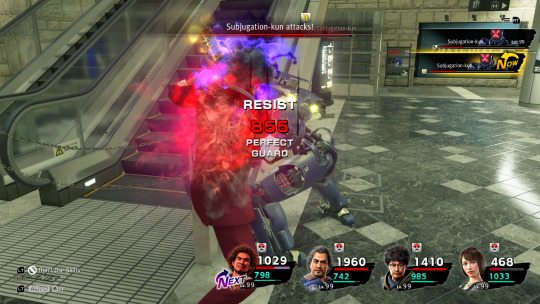
Put another way, it’s not reasonable to expect a player to Tiger Drop every single attack a boss throws at them in Kiryu Saga games. It’s far more reasonable (and for the entirety of the True Final Millennium Tower, basically expected) for the player to Perfect Guard (and hypothetically, counter) every single attack in Like a Dragon. This isn’t a mismatch so fundamental that it can’t be implemented in future games, but at the very least, its absence is unsurprising and not strongly felt.
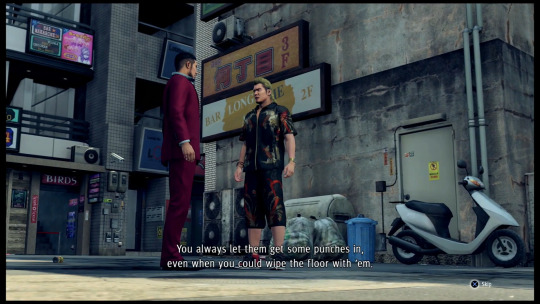
Furthermore, counters thematically make more sense for Kiryu Saga protagonists than Ichiban. Superficially, counters don’t exactly vibe with Ichiban’s turn-based sense of fair fighting. Not much point in giving someone a chance to take a shot at you if you just punch them out of their turn. (And funnily enough, while my Dragon Quest knowledge is just about nonexistent, the small bit of research I’ve done indicates that counter skills weren’t accessible to Dragon Quest heroes until about 2006, a few years after Ichiban goes to jail.)
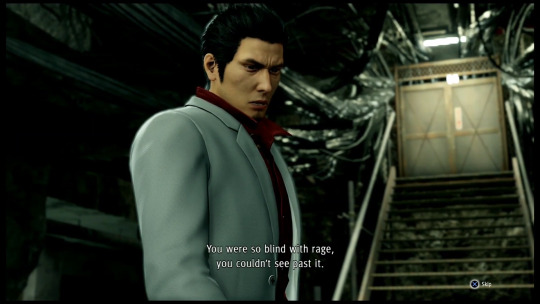
On a deeper level, though, counters are inherently more reactive than they are active. Even if you make a prediction that an enemy will attack a certain way, counters don’t work unless they actually do take that action of attacking. Prepping a Tiger Drop means not doing much else but taking up a fighting stance and waiting in bated breath until someone else does something first. This patience intrinsic to counters is temperamentally more suited for the calmer, more stoic Kiryu Saga protagonists (I recognize I’m talking in very broad strokes) than they are for the more hot-blooded, openly emotional Ichiban. Hell, if you really wanna stretch this idea, it’s worth noting that the younger, more impulsive Kiryu doesn’t have access to a powerful counter in 0 while the younger, more restrained Majima does (see the Demonfire counter mentioned above); contrast their playable appearances in Kiwami 2, where the older, more measured Kiryu can relearn his trusty Tiger Drop while the older, openly wilder Majima has no comparable counter.
So the Yakuza combat staple of Tiger Drop and counters didn’t make the transition into Like a Dragon. I don’t think anyone expected them to, and they certainly didn’t need to. All in all, not a big deal.
What about Heat Actions?
(continued)
2 notes
·
View notes
Text
coldhands identity is brave danny flint
Could Coldhands be Brave Danny Flint? It sounds crackpot, and very likely is, but the more I thought about it the more it appealed to me. I've done a quick search, one or two people seem to have floated this before but it's never had much in-depth analysis. This is my first meta, so please be gentle and C&C welcome.
The Gender Agenda
To start with, I'll start with the elephant in the room - Danny Flint was a girl, Coldhands is male. Or is he? Gilly, Meera, and Bran all refer to him as male, but they have no idea who he is, so would see Night's Watch clothes and assume. He wears a scarf over his face, and while they can see his eyes and that his face is pale, it took Bran's gang a decent amount of time to work out he was a walking corpse, so I'm not sure I trust them to figure out niceties like gender.
Leaf's "They killed him long ago" is more of a problem - she's a colleague, she would probably know. My best defence is that maybe Children of the Forest don't do gender in the same way as humans? This feels like a reach, but we have had another magical species with sexual fluidity leading to trouble with pronouns in the series. Otherwise, Leaf tends to hang out in the cave, Coldhands can't get in, maybe they're just not that close.
Finally, the main person to ask - Coldhands his or her self. The only other post I could see on reddit about this theory had someone respond with the quote "Once the heart has ceased to beat, a man's blood runs down into his extremities, where it thickens and congeals. His hands and feet swell up and turn as black as pudding. The rest of him becomes as white as milk", but I'd point out this is in third person and a generalization - "a man", not "me, Coldhands, the man".
Okay, now I've convinced everyone my theory is terrible, let's get into the meat of it.
Hands cold as stone
This was what got me into this rabbit hole in the first place - House Flint's sigil is "A grey stone hand upon a white inverted pall on paly black and grey". A stone hand would be pretty cold, right? In point of fact, when we first met Coldhands, the final line of the chapter describes "fingers hard as stone." On top of that, the white and black background seems to fit the Night's Watch blacks, pale face, black hands, white snow, etc.
Who the hell else could it be?
This has always been the weird thing about Coldhands for me. Honestly, there's a very good chance this is a non mystery mystery, he's a zombie Night's watch ranger riding an elk, do we really need a secret identity? However, "who is Coldhands?" is one of the most commonly asked questions in the fandom, so let's assume it's getting an answer. We know: a) night's watch member b) killed a long time ago, as reckoned by a 200 year old, c) not Benjen. There are essentially 3 historical periods where we know any specifics about the Night's Watch: 1) the long night/age of heroes, 2) Targaryen era, 3) recent history. If we work through these backwards, we can pretty much rule out the recent era for not meeting the criteria of "killed a long time ago". The Targaryen era didn't have much Night's Watch drama, a few kings sent to the wall at Aegon's conquest, Raymun Redbeard's invasion is wall related but the whole point of that story is that the Night's Watch failed to really get involved... the only strong contender from this period is a mysterious magical Targaryen bastard who went to the wall and went missing... but he's the other mysterious good zombie wandering around up north. The long night has a lot of Night's Watch focus, but it was 10,000 years ago. Allowing for this being in-universe exaggeration, it's still ~2,000 years ago, and if Coldhands were that old, I'm not sure he'd be in elk-riding mutineer-killing form, or at least not look passably human to Bran and co. This rules out specific timeline characters, which leaves more folkloric characters like Danny Flint, who isn't associated to any one point in time. There's a song, and she's treated as a well-known tale, which implies a fairly long time, but overall could be whenever. This works for any of the folkloric Night's Watch characters, but the Rat King is already otherwise occupied with a different cannibalistic pseudo immortality, leaving Mad Axe, who does have the massacring fellow brothers down pat, but doesn't feel thematically right to me. This section really grew in the writing, but TL;DR - assuming Coldhands is someone we've heard of before, no specific historical figures seem to match up chronologically, leaving figures from folk tales and songs, which there are only so many of.
Mutineer Massacre
For a character we've all obsessed over so much, it's easy to forget how little we've seen of Coldhands. His role in the story has effectively been "transport Sam and Gilly to the wall, transport Bran and co to Bloodraven, massacre the Night's Watch mutineers". Hold up, one of those things is not like the others. During his quest to get Bran to Bloodraven, to awake the messiah and save the world, Coldhands takes a break and makes a detour to kill the Night's Watch Mutineers from Crasters. This is explicitly noted to be something they slow down for, when time is critical. Admittedly, it secures the party some delicious Long Pork when supplies are low, but even in aDwD it seems like there are other ways to get meat than to hunt humans, besides which he kills not one but five mutineers. He claims it is because the mutineers are following them, but Meera points out they've been circling for days - it seems Coldhands deliberately sought the mutineers out. The brutality of the kills also suggests more than utilitarian pragmatism - there are entrails slung through branches and severed heads! All of this to say, Coldhands is deliberately shown as both a member of the Night's Watch, and willing/going out of his way to punish Night's Watch brothers who break their vows and harm their fellow brothers, something Danny Flint might take personally. Basically, it's a classic exploitation movie with an elk-riding zombie as the wronged woman hunting down wrongdoers. Someone call Tarantino to direct this.
A True Night's Watch
One of the big themes GRRM loves is the idea that outsiders to an institution can be the truest embodiment of that institution - Dunk and Brienne are the truest Knights, Davos is the truest lord, the Manderlys are the most loyal northerners. Coldhands already seems to tie into this - the Night's Watch are tireless defenders from the Others and their Wights, so ironically the staunchest ranger is undead as well. It would only emphasise this theme if this ultimate Night's Watch ranger was someone who was barred from entry, had to sneak in, and was murdered by their brothers for not belonging. There also seems to be a thematic tie in that Danny Flint had to essentially infiltrate the Night's Watch and keep her cover in hostile terrain, much like Coldhands in the Others controlled north.
Bonding over being murdered by your brothers
Coldhands has so far been very much one of Bran's cast, but it's worth noting characters can switch storylines, and we have someone else in the North who can soon relate to being a back-from-the-dead Night's Watchman fighting the Others - I'm hardly the first to note the Coldhands/Jon parallels, but Coldhands being another character who was murdered by the Night's Watch due to their conservatism and hatred of outsiders would add another layer.
Miscellany
A couple of quotes I found while researching for this:
“Did Mance ever sing of Brave Danny Flint?” “Not as I recall. Who was he?” (ADWD Jon XII)
- Tormund and Jon talking, Tormund mistaking Danny Flint for a man, this feels like one of those throw-away lines GRRM likes to include to make a little double meaning once the truth is out, or just seeding the idea of mistaking Danny Flint for a man.
“The ranger wore the black of the Night’s Watch, but what if he was not a man at all?" (ADWD Bran I)
- again, I could see GRRM giggling as he typed that if this theory were true.
Conclusion
Honestly, there is every chance this is absolute nonsense, and I've just lost it waiting for TWoW. I tend to lean towards Coldhands not having a big identity reveal, he's an undead ranger co-opted by Bloodraven and that's enough. However, if Coldhands is to have an identity reveal, I think Danny Flint deserves consideration: there aren't that many viable candidates, her story is emotionally intense enough and has been referred to often enough that a casual fan could be expected to go "oh!" instead of "...let me google that", and it would fit with existing themes of the story. The angle of Jon parallels even gives an opening for the reveal to be natural and facilitate character and thematic arcs, which is what I look for in a theory.
comment on reddit
Yeah, the Flint (of Flint's Finger) sigil literally being a Cold Hand is what sold me on this when I started looking into it. There's also some other intriguing textual stuff about it...
The weird thing about Danny Flint is that she is only mentioned three times in all of ASOIAF. Three! Bran recounts her tale in Bran IV, ASOS; Theon hears Wyman Manderly demand her song in The Prince of Winterfell, ADWD; and Jon discusses her tale with Tormund in Jon XII, ADWD.
This was kind of shocking to me. Danny Flint is a pretty recognizable name to, I’d figure, the majority of attentive readers. I thought she must have been mentioned before the third book, at least, but… nope. Her tale is first introduced to us in Bran IV, ASOS, the Nightfort chapter… Oh, what’s that? Wait, isn’t that… the very same Nightfort chapter where we first hear about Coldhands? (Well, no, actually, he appears at the end of Samwell III before that, but this is the first chapter where he is identified as Coldhands.) Chronologically, Sam meets Coldhands, Bran thinks about Danny Flint, and then Sam introduces Bran to Coldhands, in fairly quick succession.
So it seems GRRM came up with Danny Flint and Coldhands around the exact same time. Interesting. Danny Flint is then not mentioned again until ADWD, when the Coldhands mystery is developed further. Double interesting.
Also, the Bran chapter directly preceding the Nightfort chapter– our first introduction to Danny Flint– is the one where Meera tells him the story of the Knight of the Laughing Tree, another tale of a northern warrior woman dressing as a man and hiding her face in service of some greater goal. Stretch? Maybe.
And why would Coldhands' face be covered at all if there WASN'T some big reveal upcoming? What utility would that have? That scarf clearly seems like a setup for SOMETHING. He doesn't need it for warmth. He's likely hiding a face that would make him recognizable to Bran/Meera/Jojen (and the readers), but died long ago... the only way that reveal could work without a ton of laborious exposition is if he took off the scarf and it was obviously a 'female' face, making it obviously Danny. It also seems likely Coldhands will interact with at least Bran and Meera again, both of whom are somewhat connected to Danny Flint’s story– Bran via his love of stories and legends, and Meera via the breaking of gender roles. So there's thematic levels to it as well.
source www . reddit . com/r/asoiaf/comments/llwm8m/coldhands_identity_spoilers_extended/
16 notes
·
View notes